#M.A. Power week!
Explore tagged Tumblr posts
Text
So thankful that I’m finally able to open my presents from my family, an excellent demonstration of discipline I might add. ALL PRAISE TO ALLAH FOR DIVINE INSPIRATION. It seems like the family is definitely pregaming our future vacation to 🇲🇽
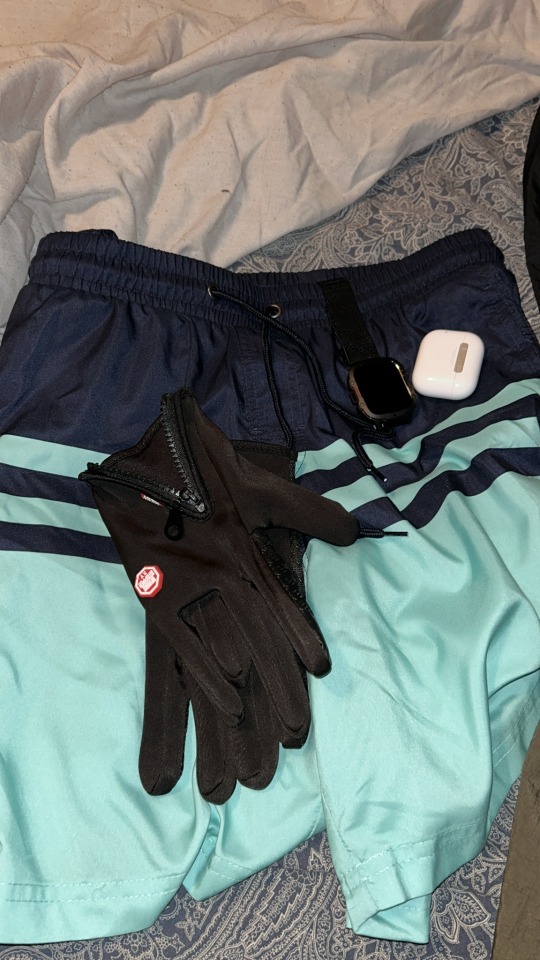
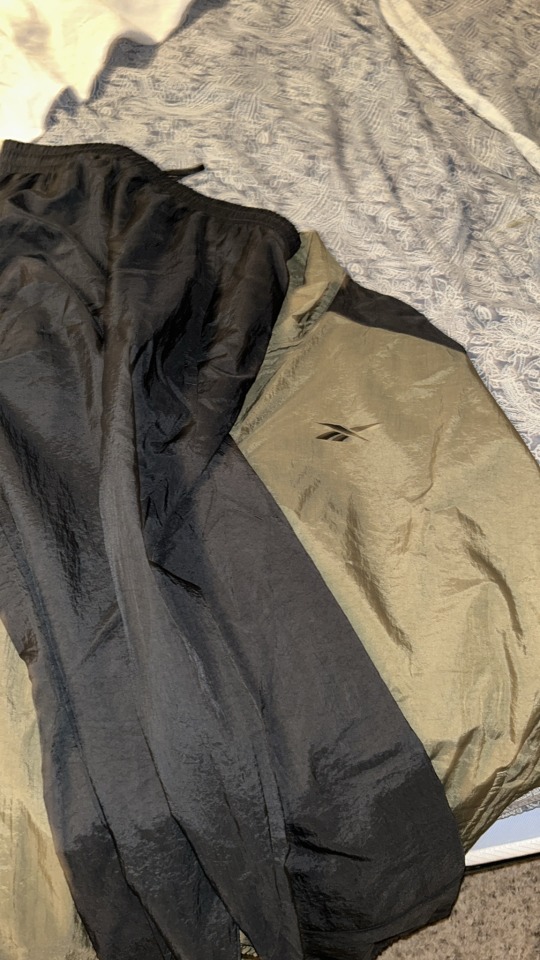
Also I have a surprise coming from my baby overseas. Praise Allah for the gift of divine love and the discipline to perfect the tuning of my frequency.
#moorishamerican#jedi#sufi#moorishamericansufijedi#allahuakbar#american 🇺🇸#moorish 🇲🇦#prophet’s birthright#M.A. Power week!#asiatic#buildwithakil#develop your discipline
2 notes
·
View notes
Note
just saw your offer for book recs and would love some fantasy/sci fi books, it seems like we have similar taste. i just finished nk jemisin's broken earth trilogy, and also loved the city we became by her.
Aha, I am at work right now and thus do not have my bookshelves at hand to make sure I'm not missing something blindly obvious. However, I will start you off with these:
The Rook and Rose trilogy by M.A. Carrick (The Mask of Mirrors, The Liar's Knot, Labyrinth's Heart). Yes, this is the series I have been screaming about nonstop for the past few weeks and thus craftily suckering unsuspecting passersby into reading. An AMAZING world, an OT3 who own my entire ass, lots of political intrigue, cultural and social commentary, a unique magic system, and also plenty of humor. It really has it all. I continue my one-man quest to make this fandom bigger. Ahem.
The Green Bone trilogy by Fonda Lee (Jade City, Jade War, Jade Legacy). Another fantastic fantasy series that NEEDS more readers. Inspired by Chinese/Hong Kong kung-fu movies, set in a gritty modern universe, kind of like the Godfather but with magical jade-wielding families. Tons of discussion of empire, culture, violence, appropriation, power, war, family, Asian identity, more. They're likewise nice and long to keep you busy.
The Daevabad trilogy by S.A. Chakraborty (The City of Brass, The Kingdom of Copper, The Empire of Gold). Another you-gotta-read-this trilogy (yes, I have many of them). Set in the 18th-century Middle East and the magical djinni kingdom of Daevabad. Politics, empire, religion, history, intrigue, magic, scheming families, ancient wars, and my most beloved, Muntadhir al-Qahtani. What is not to love.
The Priory of the Orange Tree and its standalone prequel, A Day of Fallen Night, by Samantha Shannon. Absolute doorstopper (800+ pages apiece) epic-with-dragons-and-medieval-worlds fantasy, like Game of Thrones if Game of Thrones was a) good b) gay c) feminist and d) had people of color. She is also the author of the Bone Season series (four books thus far) which is a unique blend of futuristic sci-fi and fantasy set in an alternate totalitarian London and a ruined Oxford.
Winter's Orbit and Ocean's Echo by Everina Maxwell. Two M/M space opera romances (set in the same universe, but can be read independently). She got her start as a fanfic writer and it shows; these are both delightful, plotty, funny, and full of sassy gay disaster homosexuals in space.
A Memory Called Empire and A Desolation Called Peace by Arkady Martine (I have read the first one, need to read the second one). Historian of medieval Byzantium writes space opera set in Space Constantinople which is also Space Tenochtitlan. Explores language, history, memory, power, identity, assimilation, and more, and is also very funny.
Autonomous, The Future of Another Timeline, and The Terraformers by Annalee Newitz. High-concept social-commentary dystopian science fiction; of the three, Terraformers (the newest one) might be my favorite. They're not related so you can read them in whatever order.
Two books that I have not read yet but I really want to: Swim Home to the Vanished by Brendan Shay Basham and To Shape a Dragon's Breath by Moniquill Blackgoose. Both are fantasy novels by Native American authors; Basham's is magical realism and Blackgoose's is about a Native American dragon-rider facing assimilation at an English (Anglish) boarding school.
Likewise coming soon and I am excited: The Jinn-Bot of Shantiport by Samit Basu. Middle Eastern-inspired fantasy, cyberpunk, techno-magic. In space!
There are definitely more that I will get home and be like oh wait yeah. But this should get you started.
99 notes
·
View notes
Text
Wip game
I'm riffing off of @seiya-starsniper , but I believe she will forgive me. She asked where the POTO Sandflower was, and I felt compelled to answer. The following snippet is from the very famous big Sandflower project for which I have not said anything up until today. It is a fully fledged human AU set in modern Paris. Art for it already exists, and it will be released with season 2 of the show. For the sake of context, the Alarie family are the Endless. Alarie, as a surname, comes from Southern France, and it means "all-powerful." "The Parisian Nightmare" is well...him. Sandflower are not the only ship of the story. The expected length is about 300k words:
~♡~
“Nuala!”
“Yes?! Is everyone alright?!”
“Yeah, we are fine. Bast thought you would like to know so I ran back.”
“Yes?”
“He is here.”
Three simple words yet each punched her right in the gut. The array of curses bubbling at the front of her consciousness remained unsaid as Nuala manoeuvred down the corridor and up the stairs towards the lighting structures.
“Where are you going?” Ishtar ran after her.
“To see.”
“You can’t see shit from there.”
“That’s not true.”
One just had to know where to stand. Nuala did: right behind the big, left spotlight, there was an opening that even the most discerning members of the audience couldn’t see. She had to sit on her knees and let the cold metal emboss itself on her skin, but it was worth it. It was worth it to make sure it was true.
She found out with horror that it indeed had been the case. The Parisian Nightmare occupied the same table as the week before, accompanied by Lucifer, Eve and Pierre Caplan, Johanna Constantine and a few members of political significance Nuala had only ever seen in passing on the TV screen in the dressing room.
“Where is Desire?” she whispered, but Ishtar had not followed her up the stairs to answer. The reigning seniors of DeLux were on stage, performing their hearts out while Nuala remained hidden behind the light for the rest of the show. Her eyes were glued to Monsieur Alarie’s face as the night progressed and came to a close. By the end, the showgirl found herself tightly pressed against the railing. She had watched as the displeasure became more and more evident on his sharp features the longer the acts lasted. Each time he would turn to speak to his acquaintances, Nuala would remember to breathe and then quickly forget once he came back into the light. When Bast thanked the public for being as wonderful as always, she could swear she saw Morpheus Alarie’s jaw clench in anger, but that sliver of emotion passed quickly. He was approached by an unknown individual who whispered something in his ear, to which the magnate only nodded, got up, bid farewell to his companions and Nuala didn’t see him again for the rest of the night. The tight knot in her stomach remained the single evidence she possessed of his existence.
Only when the curtains dropped and the jazz band was introduced, Nuala ran down the stairs and into the dressing room, slamming the door behind her.
“You look like you’ve seen a ghost.” Bast chuckled, peeling off her false eyelash.
“More or less.” Nuala breathed in and out slowly, trying to reinstate her composure.
“Don’t dismiss the concept too fast.” Ishtar pointed towards Nuala’s station. “The Phantom of the cabaret was here again.”
The bouquet on her makeup station was nothing short of a deja-vu - the roses, the lotuses, the baby-breathes, the envelope next to it, and the blinding rage that overcame Nuala's senses. She rushed to grab the brief, this time sealed with a golden insignia.
“The Alarie insignia?” Nuala turned it to her friends.
For the first time since she’d known her, Bast had nothing to say, but Nuala saw her shiver before nodding. The insignia was anything but simple, but the showgirl refused to inspect it. She cracked it open, rushing to take out the note from inside.
“My wishes remain unchanged. Join me. It does not suit you to hide.”
M.A.
~♡~
This fic has so many ships in it, and I refuse to choose a fave even if Sandflower are main. DesirexLucifer, Clurahob (god Bless the real agenda has been Clurahob all along) BastxJohanna, OrpheusxCorinthian, DeathxWanda, IshtarxDestruction, even some Dreamling leftovers...I love this story so much you people don't understand...anyways! Yes. That's it from me for now.
#the sandman#nuala of the faerie#nuala#the sandman netflix#nuala the sandman#dream of the endless#morpheus#sandflower#the sandman comics#nuala sandman#sandman fanfic
10 notes
·
View notes
Text
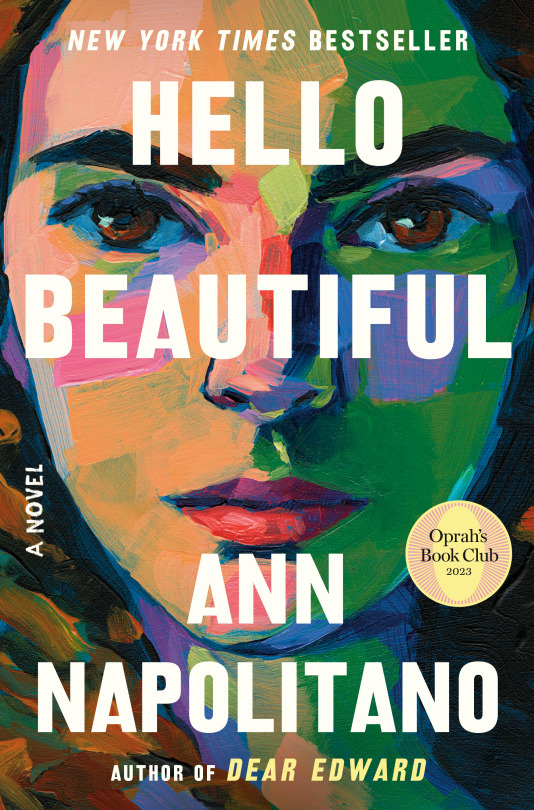
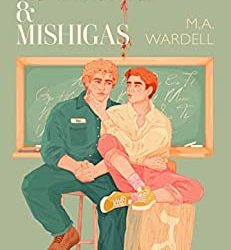
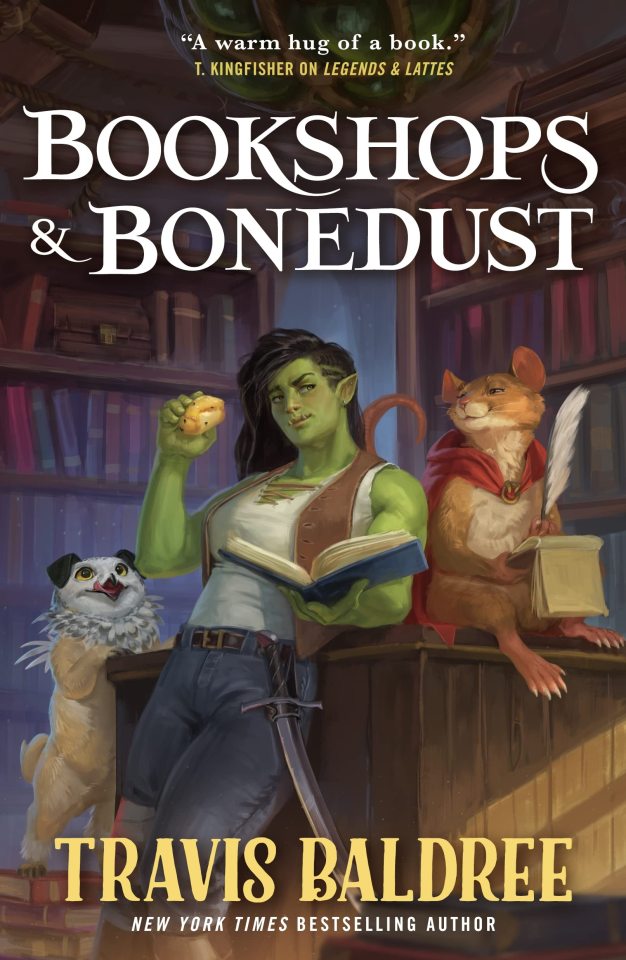
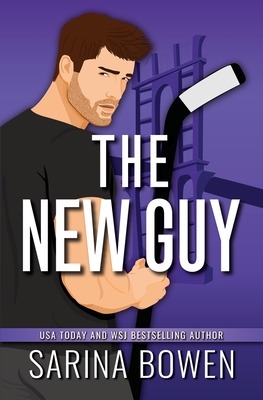
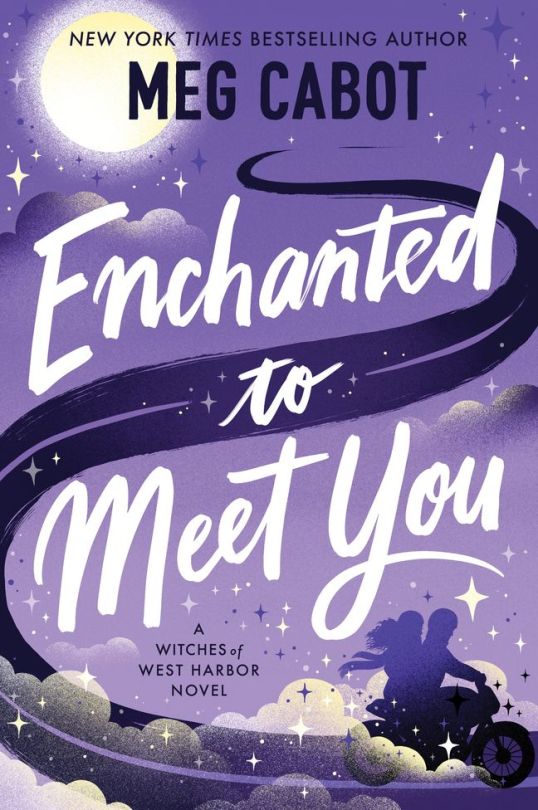
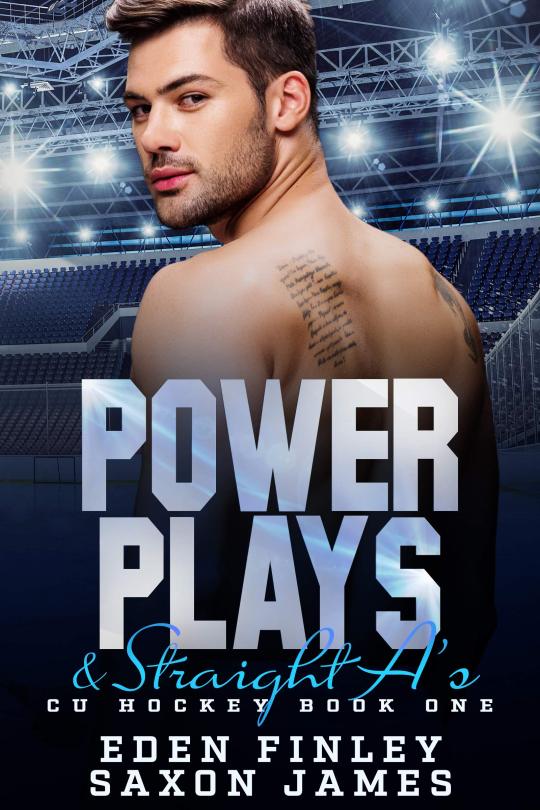
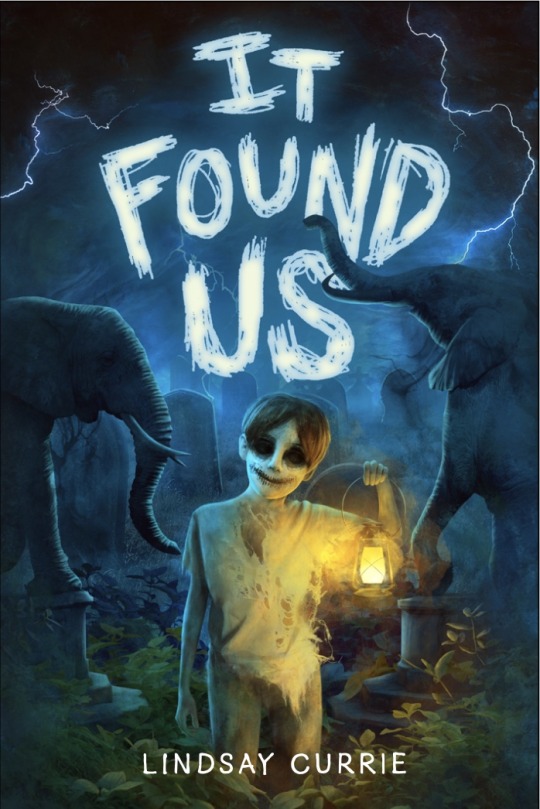
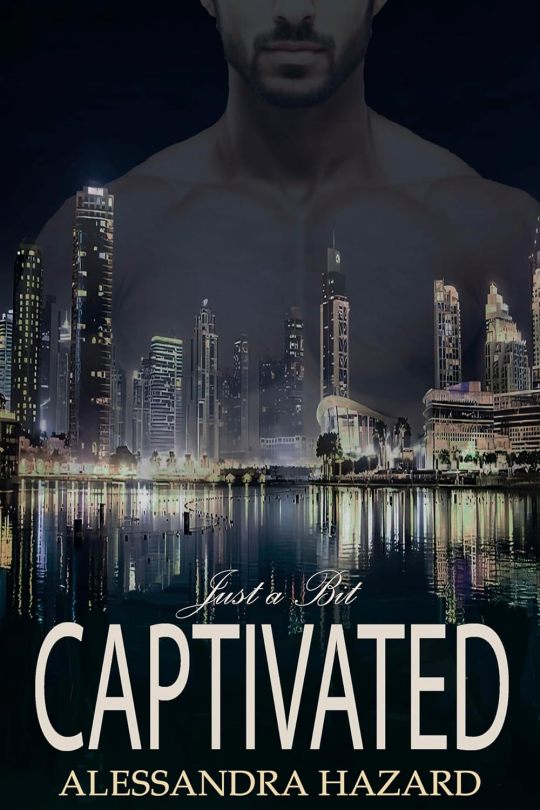
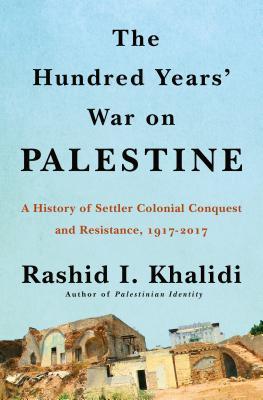
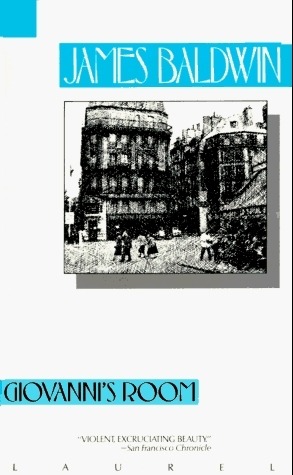
REVIEWS OF THE WEEK!
Books I’ve read so far in 2023!
Friend me on Goodreads here to follow my more up to date reading journey for the year!
___
247. Hello Beautiful by Ann Napolitano--⭐️⭐️⭐️⭐️⭐️
Have you ever finished a book and just sat there in awe, thinking about all of the ways that it broke your heart? This was me with HELLO BEAUTIFUL. Not to be punny, but this book was beautiful. Napolitano's novel was heartbreaking, memorable, destructive, and full of moments that had me outright crying.
We follow a family who essentially adopts a man (who marries into the family) who didn't have much of a family presence growing up due to a tragedy in his childhood. The journey we take over the decades as this family evolves, separates, and comes to terms with who they are is a heavy one, but also eye-opening. We see the cycle of emotional abuse and its consequences; the expectations placed on children to be better than their parents and its sometimes detrimental effects; and the power of love that comes from the most unexpected places.
This is a complex story of family and mental health. It tackles some topics that are often shied from in society, and the consequences of decisions that send ripples through time. There were characters I hated, others I loved, and others I truly hoped would find their happiness.
This was one of my favourites of the year, hands down. The tears on my face as the ending drew closer is proof that this book destroyed me and honestly, I'm grateful I was able to experience that because I normally don't pick up books like this one.
___
248. Mistletoe and Mishigas by M.A. Wardell--⭐️⭐️⭐️⭐️
Okay, I'm not a huge fan of Holiday books because I find the whole theme kind of cringe and meh LOL, but I devoured the shit out of this book. MISTLETOE & MISHIGAS was adorable af and I couldn't stop reading it.
I loved the grouchy MC and the sugary sweet MC. I loved that one kept putting his foot in his mouth, and the other started to stand up for himself. I loved their dynamic and how they brought each others' best selves out. The grouchy MC's family was a delight and they were HILARIOUS.
Was this book super deep? At times. It dealt with the grouchy MC's PTSD and his fear of finding love again because of his grief and past experiences, and it also dealt with the sunshine MC's homophobic family and their abandonment. These parts were powerful and I liked that the two of them were able to work through or with their traumatic experiences.
Another thing I don't like about Holiday books is that because they're set in such a tight timeline, we often get things at a sped-up rate. In the case of this adorable book, we get an almost insta-lovey relationship that gets steamy hella fast (which I'm fine with, but I did giggle at that first 'baby' that hit at a questionable time), and a distorted sense of time to be falling all the way to the L word because truly, has enough time passed for this word to be coming into play? But the Holiday timeline will always be an escalator for love because time is of the essence.
Beyond that, this was ridiculously adorable and like the perfect shot of cuteness to get you into the Holiday spirit. I love these two messy men and that they were in their 30s!!!! You know how hard it is to find a cute book where the characters aren't in uni or in their 20s? It was weirdly refreshing (mainly because I am in my mid-thirties.)
Will try the first book in the series at some point in my life!
___
249. Bookshops & Bonedust by Travis Baldree--⭐️⭐️⭐️
I'm convinced these books aren't for me. I read them both and while I was entertained for a bit, I got to the point where I just wanted the story to end. I did love the bookselling theme and how the MC tried her best to help the bookstore and its owner, but that was about all I really cared for in this book.
Oh, and seeing the MC fall into books that way so many of us do.
But while I can see why so many enjoy these cozy mystery books, I'm just missing that sense of "why am I reading this?"
I think I liked this one more than the first one, but to be completely honest, I'm not even 100% sure I remember what happened LOL.
Three stars for the bookselling and book reading portions, the rest I just...yeah. I don't think I'll be trying the next book--it all depends on when it comes out lol
___
250. The New Guy by Sarina Bowen--⭐️⭐️⭐️⭐️⭐️
I'm so happy to be back in the world of Sarina Bowen. I saw this book on a friend's book haul and I needed it immediately, so I got my excited hands on it and devoured it. I missed reading the fun world of hockey with queer men. Sigh, I will admit that this has now sent me down that same black hole spiral that I experience at least once every year.
We get two perspectives: a single and widowed dad and a hockey player who is struggling to find a permanent home since he has been traded one too many times. As these two characters fight against their growing attraction to each other, we get to see some great character growth and truths that really bring too much to light.
I loved this book because of the tropes presented, but also because these two men experience so many different emotions together that you can't help but hope that they get to have their HEA. There's so much angst and sexy times, that it was hard to put the book down. But besides that obvious spicy side, I loved the side relationships and how the characters remembered to keep their heads on while either working or playing their sport. It's one of the things I love that authors sometimes do--that no matter what the characters are experiencing, it doesn't affect the core thing they love to do.
Also, the side characters were great and I loved all of them--especially the single dad MC's daughter and how big her personality was.
This was a lot of fun and I really need to check out the next book!
___
251. Enchanted to Meet You by Meg Cabot--⭐️⭐️⭐️
In rating this a three star, I'm realizing how my rating system is so skewed. I'm rating this three stars because it was fun, but it wasn't the best thing I've ever read. It was very insta-romance and kind of over the top. But I'm going to be super honest: When it comes to Meg Cabot, I expect nothing less and I usually have a great time.
So, despite its imperfections, ENCHANTED TO MEET YOU was a lot of fun. There was a cheesy romance, a badass but kind MC, and a somewhat unbelievable menace that gave me strong THE CRAFT vibes. I wish I had read this in October because it would have been perfect.
I thought the cast of characters were sweet and the love interest (second MC) sounded fine af. There's a specific description of him during a spicy scene that had me rewinding the audiobook just to hear it again. Also, that's another thing! While it wasn't overly described, the fading to black wasn't as obvious as Cabot's previous series.
Also, hello some queer rep in this one! And a beautiful plus-size MC! Love.
I hope that this series doesn't go the way of her last one, which got steadily worse. I will hold out hope and will definitely be picking up the sequel.
___
252. Power Plays & Straight A's by Eden Finley & Saxon James--⭐️⭐️⭐️⭐️⭐️
Re-read in November 2023
The happiness and giddiness I felt when I fell into this world again. I love these characters and how they communicate and how they are together. Reading this again felt like the first time, because I had forgotten so much of what had happened and I got to experience it all again :')
I like that these characters are imperfect and how they work together. One is socially awkward and the other is basically the king of hockey on campus. They are an interesting pair that somehow work and have the cutest and spiciest moments.
I love these boys and I can't wait to re-read this book again in a few years LOL.
___
253. It Found Us by Lindsay Currie--⭐️⭐️⭐️
This was a fun and spooky mystery! I think the cover is creepier than the story itself, but it definitely had some moment where I know a middle school reader will have a few sleepless nights.
I loved the concept of this young MC being a detective because of how many other potential mysteries she could solve, especially now that she has her friend and brother helping her. I wouldn't say no to a sequel with more paranormal happenings in this small town--kind of gave me CITY OF GHOSTS vibes and I'm not mad at it.
I think I'm not rating this higher because while I was entertained, it didn't blow my mind. It was an enjoyable experience, however, and I'm definitely intrigued. I liked the character growth and the teamwork that happened--especially since I know younger readers who might pick this up might benefit from seeing healthy sibling relationships like the one in this book.
I do recommend this for anyone looking for a spooky middle grade novel that won't make them too scared to turn the lights off, but might creep them out with the stretched out smiles we sometimes hear about in IT FOUND US.
___
254. Just A Bit Captivating by Alessandra Hazard--⭐️⭐️⭐️⭐️⭐️
I bow down to Alessandra Hazard for writing 14 books (so far) in this series and making me love most of them. JUST A BIT CAPTIVATED is her latest and the way I KEPT checking to see the release date...phew. When I pick up one of these books (to read for the first time, or re-read), I KNOW I'm going to be...captivated.
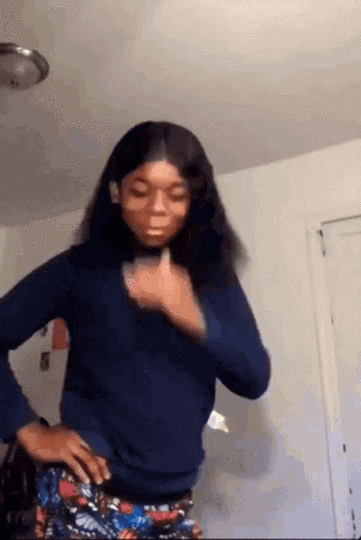
This was another twisted romance and listen, I am TRASH for these books. Whereas in other books I'd be giving the storyline a massive side eye, something about Hazard's over the top situations are so ridiculously addicting and weirdly endearing? I want to root for both characters, even though one of them is a massive asshole. But listen, it's fiction--romance red flags are not real life goals, okay?
I highly recommend reading this series if you want stories that captivate you and make you question your morals on occasion (but just for the sake of the books.)
___
255. The Hundred Years' War on Palestine by Rashid Khalidi--⭐️⭐️⭐️⭐️
I will pre-empt my review by stating that the reason why I'm giving this four stars instead of five is because I'm not much of a history lover, so this was a bit of a heavy read in terms of textual information and my brain's inability to fully engage in historical nonfiction. Other than that, this book was incredibly informative.
I've been trying to stay informed and have been trying my best to show my support in the best ways I can, but I find that reading up on the history of the beautiful Palestine and how it has been besieged for over a century is incredibly important. I learned a lot through this text and I definitely believe that it should be on everyone's TBR. There were definitely some aspects I wish we learned more about in this one (I have learned about missing information through my own research and watching videos of those who are hella informed). But I also know that this text is a bit older and a lot of newer information has most likely come to light since its publication.
Important, powerful, and eye-opening, Rashid Khalidi's The Hundred Years' War on Palestine is a must-read.
___
256. Giovanni's Room by James Baldwin--⭐️⭐️⭐️⭐️
I'm surprised it took me this long to read the heartbreaking book that is GIOVANNI'S ROOM. I've read various Gay literary fiction titles and while I always enjoy the journey, I'm always heartbroken or feeling some intense emotion by the end. Baldwin's novel didn't spare me from this experience.
GIOVANNI'S ROOM is messy, but in the most tragic way possible. This is a novel about a man who experiences one of the biggest emotions a human could experience, but both the time, his life experiences, and the expectations of what it means to be a "man" got in the way of him taking that leap into the abandonment of love. By the end, I couldn't help but cry for him, but also cry for Giovanni and the what could be's that mirror the life these two men lived on the pages of Baldwin's masterpiece.
The final line of this book will forever haunt me and if you've read this book, you know that that imagery not only will haunt the character forever, but also the reader.
Also, if you haven't done so--I highly recommend reading SWIMMING IN THE DARK because this felt very much like a reversal of characters if it was a retelling of GIOVANNI'S ROOM. Both are beautiful and both will absolutely break you/make you think about those who shared these characters' fates in real life.
I took a star away because the writing sometimes felt a little dry, BUT with that being said, I listened to the audiobook and the enunciation and reading of the narrator was GORGEOUS.
I'm glad I finally experienced this gorgeous and messy book. Also, I both wanted Giovanni to get therapy and to also be given the love he always craved and lost. My God, my heart cries for Giovanni.
___
Have you read any of these books? Let me know your thoughts!
___
Happy reading!
#Review#Reviews#Book Reviews#on books#on reading#book blog#book blogger#Features#book list#booklr#bookworm#bookaholic#long text post#2023#book review#books#read#reading#bookish#books of tumblr#readers of tumblr#books and reading#my writing#my opinion
18 notes
·
View notes
Text
Carmen Sandiego Heritage:
Since the events of O.A Reckoning, Carmen's been grappling with the revelation of dexter wolfe's real life. It's not even been two weeks, and Carmen's back in the field, facing paper star in the tibet mountains, risking frozen death. During the fight, she tells carmen that she's in possession of sensitive documents detailing dexter wolfe from the mexican coastline. Therefore, she decides to trust her because she's curious as to the extent of things. Unbeknownst to carmen, paper star stole a powerful shield artifact...
In mexico, they arrive at her hideout there and carmen finds the documents in a hidden drawer, bound in chrome and aged paper. Opening it, you can tell the thought behind the notes, neat and tidy, with questionable offshot arrows, asking questions. Oh, the story Lloyd told was true, with notes on powers and slight thoughts from wrath seeping through. It goes back to his birth and helping a sleuth, hinted to be of the holmes name. There's his wolfe alias life to play to his unique aging aspects, even a new family photo that he personally adored. Carmen takes this, as well as the whole file.
Suddenly, paper star turns on Carmen with a shield. She tries to disarm her, but the shield budges no inch. After a long fight, paper star gains the upper hand, until carmen taps into her 'heritage'. No weapon, No powers. Just a heightened stamina and skillset buff. With this carmen takes the shield away from her and leaves a defeated paper star for acme. Sure enough they shortly arrive and they book her. Julia decides to crack open a crate qnd it reveals multiple lost M.A objects for 25 years. There's materials, weaponry and a briefcase that magically disappears in public view. The leftover, a name: The professor.
At home, carmen shows her mother the image and files on their father whilst the fostered sleep soundly. They embrace each other as they fall asleep, image safe in a frame on the table. Carmen couldn't explain one note: wolfe's tech wasn't just his invention or vile. In the concentration camp overthrows, he mentions searching for the professor and the briefcase the family had. What's in the briefcase? Where is it? She decided to sleep and investigate tomorrow.
0 notes
Text
NBA 2K24’s soundtrack celebrates 50th anniversary of hip-hop

The motivation for the soundtrack this time around is focused on integrating genre-defining songs from the past and present, as well as highlighting rising works from the next generation of artists, in recognition of the 50th anniversary of hip-hop and the 25th anniversary of the NBA 2K franchise. While the official track list for the NBA 2K24 soundtrack has yet to be revealed in full at the time of writing, 2K did unveil a handful of artists and songs that players can expect to be featured in the game this year. Here is a list of songs that have been officially confirmed to be in NBA 2K24 at launch: - “Just Wanna Rock” – Lil Uzi Vert - “Walk” – Kodak Black - “In Ha Mood” – Ice Spice - “Kobe Bryant” – Lil Wayne - “Bad Habit” – Steve Lacy - “hooligan” – Baby Keem - “90 Proof” – Smino and J. Cole - “Breakfast In Monaco” – Larry June and The Alchemist - “Black” – YoungBoy Never Broke Again - In continued partnership with Def Jam Recordings, Season One of NBA 2K24 is set to feature the following tracks as part of the first batch of new offerings coming to the soundtrack post-launch: - “This DJ (feat. O.G.L.B.)” – Warren G - “Hustlin” – Rick Ross - “GOATED. (feat. Denzel Curry)” – Armani White - “2 Certified” – Hit-Boy and Avelino - “My Time” – Haiti Babii - “FOLD” – SwaVay - “Dolla” – Navy Blue - “Crazy” – Connie Diiamond - “Stand Out” – Jex Nwalor On Sept. 1, a Twitter account named NBA 2K24 Community posted a screen recording of what appeared to be a Spotify playlist of the full NBA 2K24 soundtrack before it was removed. Considering the cover art and a number of tracks seen in there have since been confirmed, it appears the following songs will also be in NBA 2K24 at launch: - “Really Really” – Kevin Gates - “B.R.O. (Better Ride Out) ” – A Boogie Wit da Hoodie - “Kilometre” – Burna Boy - “One Up” – Central Cee - “Pick A Side” – WAP5TAR and Young M.A. - “HOTEL LOBBY (Unc & Phew)” – Quavo and Takeoff - “Internet Trolls (feat. Hitkidd)” – GloRilla - “Rumble” – Skrillex, Fred again.., and Flowdan - “AHORA QUÉ” – Quevedo - “Me or Sum (feat. Future & Lil Baby)” – Nardo Wick - “Conceited” – Flo Milli - “Again” – P-Lo, E-40, and LaRussell - “Tradeline” – Ray Vaughn - “A Mí ” – Rels B - “Still Omw” – Blxst - “Power Power (feat. Shaun Ross)” – Duckwrth - “Big Steppa” – Rome Streetz - “Thru the Week” – Kamaiyah - “Fall Back” – Destiny Rogers and CARELESS - “GILA GILA feat. JP THE WAVY, YZERR” – Awich - “Bogo” – Cookie$ - “Black And White” – Nasty C and Ari Lennox - “2 Certified (feat. Avelino)” – Hit-Boy - “Doubted Me” – Kaash Paige NBA 2K24 is set to release on Sept. 8 for PlayStation 5, PS4, Xbox Series X|S, Xbox One, Nintendo Switch, and PC. Read the full article
0 notes
Text
Billboard USA Exclusion Zone Episode 6 (03/18/2023)

Remember two or three weeks ago when I said that there's big rift or differences between Global 200 and Global Excl US chart? Well the rift is getting more obvious when you look at the chart this week where a certain country artist album bombed the Global 200. But, in this chart he only charted one song. Well let's talk about it in detail soon.
---------------------------------------------
16. "on the street" by j-hope ft. J Cole
You know J Cole has stated that his career from 2013 onward is always trying to erase "Work Out", his first charting hit, from people's memories because Nas didn't like the song. Well not only is the beat to this song is significantly worse than "Work Out", but you can't even stay on beat. I am not a fan of J Cole and even I'm disappointed in this.
42. "Shorty Party" by Cartel de Santa ft. La Kelly
This sounds like if "Therefore I Am" by Billie Eilish was 50% less good and in Spanish and the song was sung by Pop Smoke.
103. "Last Night" by Morgan Wallen
So I am in this community filled with chart nerds and music reviewers. And the running joke is always that Morgan Wallen, as much as he's one of the biggest artists in America, never charted in Global Excl US chart. Even with the album nuke that happened in Global 200, people expected that the song won't chart. But thanks to Canada and Australia, we have the first Morgan Wallen song to debut.
This song and Morgan Wallen's popularity as a whole has been a contention in the music twitter sphere because he seems to be more popular after the n word incident. This incident brings up the debate of separate the art from the artist. I hate to say it but the whole Morgan Wallen persona has always been that he's drunk asshole. So there's still lingering sense that the incident is him in the song. In Last Night too he talked about a breakup and there's a mentioned of alcohol in it. So yeah you can't really separate the art from the artist here.
But that raise another question, why is his popularity in the United States is massive despite what the stan twitter led you believe. Well the truth is most of the Morgan Wallen's listeners aren't on twitter. They're the silent majority and the silent majority is overall the most powerful listeners in America at least. And also that he has embraced streaming, it created the perfect formula for US popularity but not for worldwide.
This also proves that popular music has become more regionalized thanks to the streaming era. Just look at the stark differences between Hot 100, Canadian Hot 100, UK Official Chart, and Japan Hot 100. Yeah they might have some overlap, but most of the songs that appeared on these charts catered to those regions. This is a stark difference even just from six years ago. Definitely something to keep an eye on.
120. "Mas Rica Que Ayer" by Anuel AA, Mambo Kingz, DJ Lulan
Phew that was a lot that I have to say about Last Night. Thank god after that it'll be brief. This song is just your standard reggaeton from a guy that most Americans knew from his song with 6ix9ine.
148. "El Azul" by Junior H X Peso Pluma
The low end of this song is fucked I'm sorry. It's like there's an earthquake in the middle of a wedding.
165. "Sem Alianca no Dedo" by MC Xenon & Gemeos Da Putaria
This sounds like if Clipping circa their horrorcore era made a Brazilian song and just forgot to mix the vocal properly. Also I heard that most Brazilian songs sampled Say It Right percussion so take that as you will.
176. "Red Ruby Da Sleeze" by Nicki Minaj
You know I think that the record execs from the early 90's that sued De La Soul and Biz Markie had some points you know.
179. "El Merengue" by Marshmello ft. Manuel Turizo
I thought that Marshmello is done ruining genres across the globe? But that Despecha song is popping so here we are.
187. "M.A (Mejores Amigos)" by BM
This song is strange. It's like a mix between reggaeton, corrido, and a hints of EDM there? I'm confused
192. "Numb" by Linkin Park
At least this week's debut ended with one of the best hit songs of the 2000's.
I highly recommend everyone to check out these songs.
#j hope#j cole#morgan wallen#anuelaa#peso pluma#nicki minaj#marshmello#manuel turizo#linkin park#rap#reggaetón#latin music#corridosybanda#brazilian music#merengue#nu metal#meteora#country music#pop music#pop#billboard charts#billboard hot 100#billboard#on the street
3 notes
·
View notes
Photo
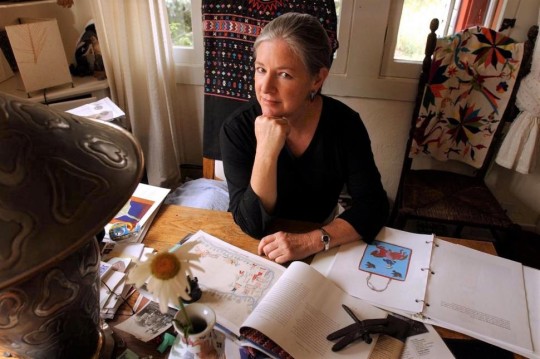
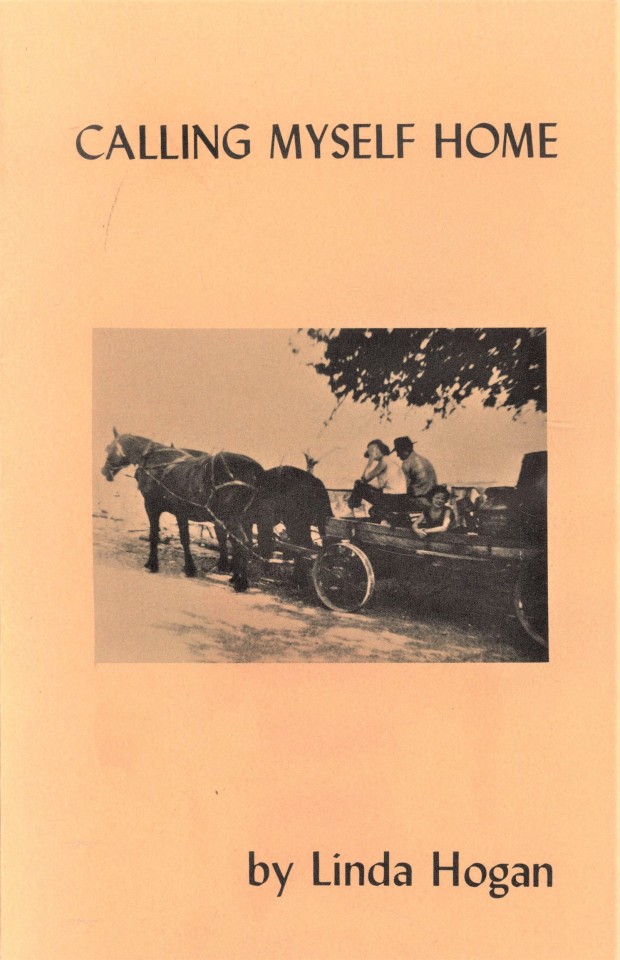
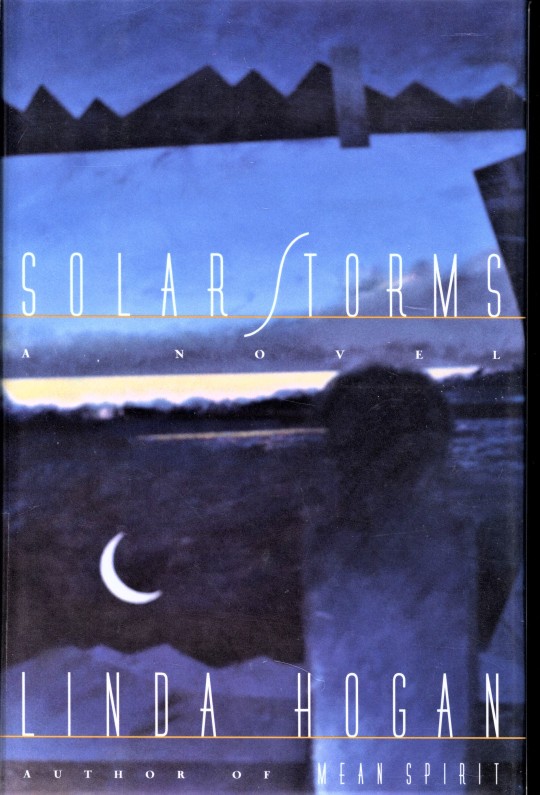
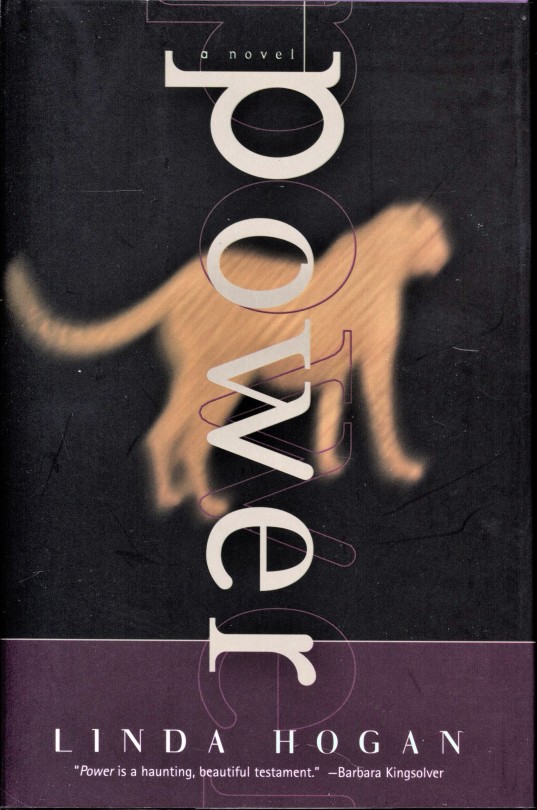
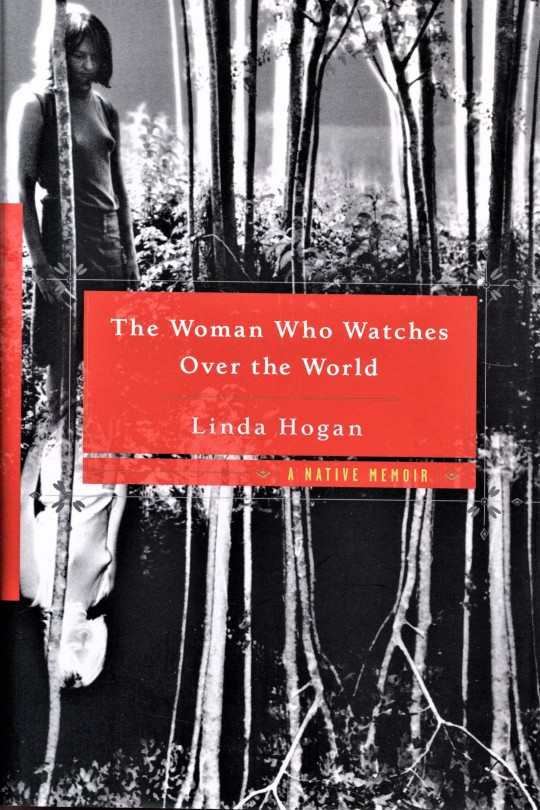
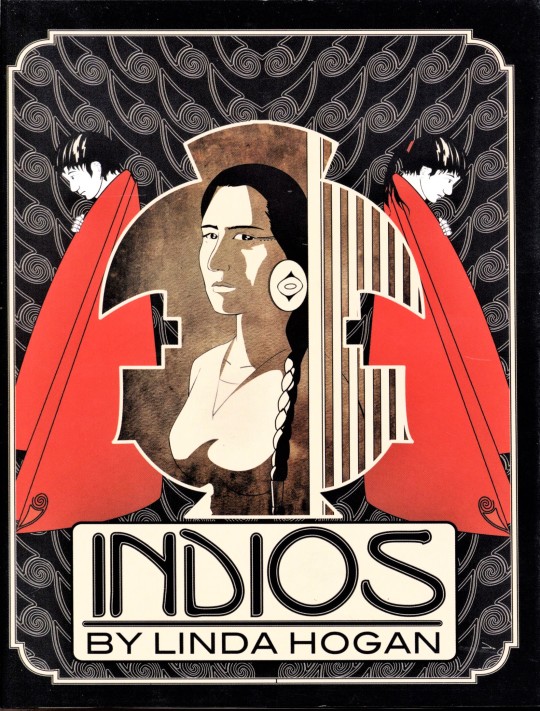
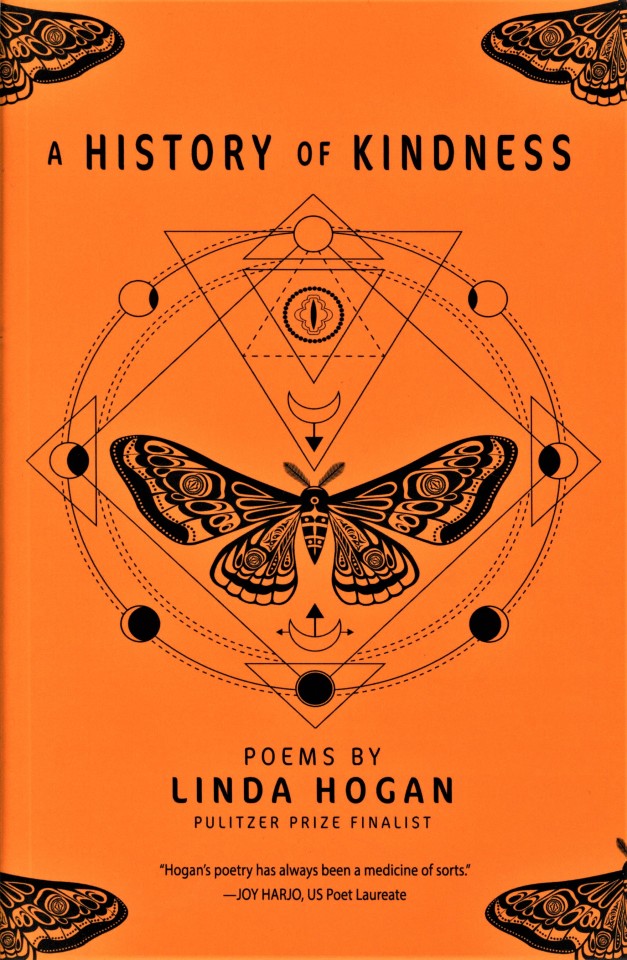
Native American/First Nations Woman Writer of the Week
LINDA HOGAN
Linda Hogan, Writer-in-Residence for the Chickasaw Nation, is an internationally recognized public reader, speaker, and writer of poetry, fiction, and essays. Her works often feature themes of environmental and Indigenous activism alongside Native Spirituality across the fiction and nonfiction genres. She earned both B.A. and M.A. degrees from the University of Colorado before beginning a teaching career, culminating in her current position as Professor Emerita at the University of Colorado. Among the long list of awards her work has received are the 2016 Thoreau Prize from PEN America (awarded to writers who have an exemplary talent for discussing nature) and the Lifetime Achievement Award from the Native Writers’ Circle of the Americas, as well as having been a Guggenheim Fellow and finalist for the Pulitzer Prize for Literature in 1991. In 2007 she was honored by her tribe by being inducted into the Chickasaw Hall of Fame. UWM Special Collections currently preserves eleven titles by Hogan in our Native American Literature Collection. Shown here in order are:
1.) Photo of Linda Hogan by Hyoung Chang.
2.) Calling Myself Home. Greenfield Center, N.Y.: Greenfield Review Press, 1978 (2nd printing 1982). This is Linda Hogan’s first book.
3.) Solar Storms: A Novel. New York: Scribner, 1995.
4.) Power. New York; London: W.W. Norton, 1998.
5.) The Woman Who Watches Over the World: A Native Memoir. New York : W.W. Norton, 2001.
6.) Indios: A Poem. . . A Performance. San Antonio, Tex.: Wings Press, 2012.
7.) A History of Kindness: Poems. Salt Lake City: Torrey House Press, 2020.
See other writers we have featured in Native American/First Nations Woman Writer of the Week.
-- Emily, Special Collections Writing Intern
#Native American/First Nations Woman Writer of the Week#Native American Literature Collection#womens history month#Linda Hogan#Chickasaw Nation#environmental activism#environmental poetry#poetry#fiction#memoirs#Native American poets#Native American writers#Native American women#Native Americans
92 notes
·
View notes
Text
The Canonization of Saint John Coltrane
The intensity of the jazz legend’s music has always inspired passion, but in the 1960s, one group of devotees was so stirred they founded a church in his name.
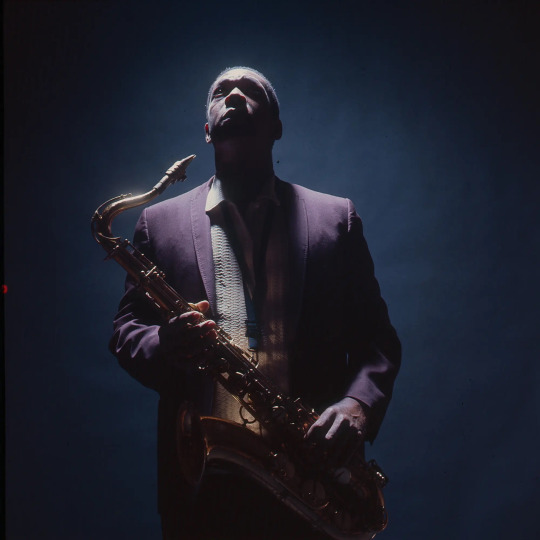
John Coltrane, photographed by Chuck Stewart in New York City, 1966. Credit. © Chuck Stewart Photography, LLC/Fireball Entertainment Group
By M.H. Miller Published Dec. 3, 2021 Updated Dec. 8, 2021
THE SAINT JOHN Coltrane Church in San Francisco — a branch of the African Orthodox Church, where the jazz musician John Coltrane is the canonized patron saint — is a family affair. It was founded in 1969 by His Eminence Archbishop Franzo W. King, D.D., and his wife, the Most Rev. Supreme Mother Marina King, before they possessed such lofty titles. (Their daughter, the Rev. Chaplain Wanika Stephens, Archpriest, M.A., is also a pastor there.) The church began around 1964, as the Jazz Club in the couple’s garage — “a listening clinic,” F.W. King, now 77, says on a recent Zoom call with his wife, 75, from their home in San Francisco’s Bayview-Hunters Point. (Their daughter, 57, also joined.) “Maybe less than a dozen brothers and sisters would come together every week. Everybody would bring a new album. We’d put the music on and start testing our ears and our knowledge,” seeing if they could name the drummer or the piano player on a track without looking at the record sleeve. One day, someone brought Coltrane’s 1965 record “A Love Supreme,” and King looked at the liner notes, which Coltrane wrote himself. “All Praise be to God to whom all praise is due,” Coltrane begins, and then tells a story: “During the year 1957,” he writes, “I experienced, by the grace of God, a spiritual awakening which was to lead me to a richer, fuller, more productive life. At that time, in gratitude, I humbly asked to be given the means and privilege to make others happy through music.” In those years, Coltrane was addicted to heroin and — so the legend goes — while experiencing withdrawals heard the voice of God and got clean, rededicating his life to music.
“I wasn’t really that impressed!” King says. “I didn’t even want to listen to the album.” His own father had been a Pentecostal minister, and King believed back then that he had “successfully escaped from the raft of the church.” This changed a few months later, when he and his wife attended a Coltrane concert at the Jazz Workshop, in San Francisco’s North Beach neighborhood, to celebrate their first wedding anniversary; the doorman was a friend and sat the couple right in front of the stage. “So we were able to get a full dose,” King says. There have been countless attempts to capture the power of Coltrane’s music — his unmatched ear for both melody and chaos, his seemingly endless ability to find new sounds in traditional chords, the complex interplay between him and his band (which, in addition to Coltrane on saxophone, included Jimmy Garrison on bass, Elvin Jones on drums and McCoy Tyner on piano) — but, to King, “It was as though he was speaking in tongues and there was fire coming from heaven — a sound baptism,” he says. “That began the evolutionary, transitional process of us becoming truly born-again believers in that anointed sound that leaped down from the tone of heaven out of the very mind of God, stepped from the very wall of creation and took on a gob of flesh, and we beheld his beauty as one that was called John.”
There is a long and rich tradition of popular music fans deifying their icons. A famous, if dubious, graffiti tag in mid-60s London consecrated the then-lead guitarist for the Yardbirds, proclaiming, “[Eric] Clapton is God.” The mythology surrounding the blues singer and guitarist Robert Johnson claims he sold his soul to the devil sometime in the 1930s in order to gain mastery over his instrument. Google a certain disgraced pop star in 2021 and the algorithm might helpfully suggest the following question: “Was Michael Jackson a gift from God?” Any musician who is heralded as the second coming tends to be brought back down to earth eventually, whether through changing tastes or human foibles (Clapton is now an anti-vaccine proponent), though there was always something different about Coltrane, whose death from cancer in 1967 at age 40 transformed him into a kind of martyr. Through the years, the story of Coltrane’s veneration has been treated by his critics and biographers as a quirky footnote to his afterlife, if not ignored entirely, but it provides a revealing glimpse at his legacy, as well as a key to understanding the intensity of his appeal.
“DO YOU HAVE a religious affiliation at all yourself?” Archbishop King asks me over Zoom. “Lapsed Catholic,” I say, which isn’t inaccurate. I suggest, somewhat humorlessly, that for this reason I consider the liner notes to “A Love Supreme” — Coltrane’s most famous recording, and one of the great achievements in all of music — to be more legitimate than the Lord’s Prayer.
“Check this out, Brother Miller,” King says, and he and his wife begin singing the “Our Father” in exquisite harmony to the tune of “Psalm,” the closing section of “A Love Supreme,” after which — and this isn’t a joke, either — I offer out my hands, clasped as if in prayer, to them in thanks.
“I think most real Coltrane devotees are lapsed religious people in one sense,” the archbishop says. “Religion is so much built on what we believe. And a lot of times what we believe is because we’ve been trained to believe it, keeping in mind that believing falls short of knowing. And if you ask too many questions for the sake of knowledge, you might get excommunicated. So we’re sympathetic with that.”
It was only after King saw Coltrane live again a few months later that he began to think of the club in his garage as more of a temple. The Kings had to travel to a venue in a white neighborhood, where King found that the audience “was not so populated with people who looked like me.” Coltrane himself had been talking about the treatment of musicians in clubs, saying that “the music is rising into something else,” and that it would need a different context. Around this time, King had been learning how to play the saxophone, and was gigging in San Francisco with his teacher, Norman Terrell Williams. The duo began attracting a following, and the venue filled up nightly with patrons. King asked Williams if, as a result, its white owner had given him a raise. “And he said, ‘Nah, man,’” King recalls. “And I said, ‘Something’s wrong with this.’ To me it was just unacceptable.”
Coltrane’s music provided an outlet for such frustrations. Around the same time that he was quoting Jesus in his liner notes, various changes were underway in San Francisco’s Black community. Black churches had been at the center of the civil rights movement for most of the 1960s, preaching a message of pacifism and nonviolence, but in 1966, when Huey P. Newton and Bobby Seale founded the Black Panther Party across the bay in Oakland, the fight for equality became a brash, revolutionary one. Around then, the Kings moved out of the garage and into a storefront in the working-class neighborhood of Visitation Valley, where they became known as the Yardbird Temple Vanguard Revolutionary Church of the Hour. Coltrane — in no small part thanks to the Kings — became the hero of not just the Black Panther Party but the burgeoning Black power movement at large. Newton often spoke of how more traditional churches had failed Black society; Miles Davis, with whom Coltrane had some of his earliest successes as a sideman, writes in his 1989 autobiography that by the time the Black Panthers formed, Coltrane’s music had become “for many blacks, the fire and passion and rage and anger and rebellion and love that they felt.”
The musician was an unexpected choice for a revolutionary lodestar, for his message was ultimately one of peace and harmony. “I think music can make the world better and, if I’m qualified, I want to do it,” he once said. Though that doesn’t mean he was apolitical: One of his finest songs, “Alabama,” was written in 1963, in response to the Ku Klux Klan’s bombing of a Baptist church in Birmingham that year, killing four Black children. It’s one of the great works of art produced by the civil rights movement, and Coltrane’s band never sounded better. Garrison and Jones work themselves into a funereal groove, and Tyner somehow makes his piano sound like it’s crying. Coltrane on the tenor sax is nothing less than the sound of dignity prevailing through overwhelming tragedy.
Though the Black Panthers were, as King notes, atheists, they became some of his church’s most ardent supporters. Out of the storefront in the Western Addition, King was preaching that Coltrane was Christ incarnate, and structuring a weekly meeting around his music, especially “A Love Supreme,” a suite in four parts — “Acknowledgement,” “Resolution,” “Pursuance,” “Psalm” — that has the loose structure of a prayer service. And King, in turn, realized that the Panthers’ Marxist ideology (“Dialectical materialism,” as Marina says with a small sigh) had more in common with the Christian faith than he might have expected.
The Kings’ dogma may have been untraditional, but for the most part they did and still do what most churches do — perform music, meditate, offer prayers, organize food drives. (Colloquially, they are known in the Bay Area as the Beans and Rice Church: “Free vegetarian meals!” Marina says excitedly at one point in our interview.) In 1972, for the Black Panther Community Survival Program at the Oakland Auditorium, the church’s house band opened for Ike and Tina Turner and helped pass out thousands of bags of groceries to families in need. Newton and Seale had promised a whole chicken in each one and told the Kings that they needed $2,000 to “get the chickens out of hostage to give them to the people.” The church raised the funds to do so and, in thanks, Newton commissioned Emory Douglas, the Panthers’ minister of culture, to make a Coltrane painting — it became something like the church’s first icon. The Kings are sitting in front of it when we speak on Zoom.
Of course, the Kings have also been met with skepticism over the years. Alice Coltrane, the artist’s widow (and his piano player in the last years of his career), was a friend of the Kings and a religious leader in her own right. She converted to Hinduism after Coltrane’s death and founded the Vedantic Center near Malibu, and the Kings considered her to be their guru. (They sing in Sanskrit on some of her early devotional music.) But in 1981, she sued the church, then known as the One Mind Temple Evolutionary Transitional Church of Christ, for copyright infringement and for using her late husband’s name without permission. A spokesman for the church at the time asked The New York Times, in its defense, “Did you ever think it was necessary to ask Mother Mary to use Jesus’ name?”
The suit was eventually dropped, but it turned out to be fortuitous; it brought the Kings to the attention of leaders in the African Orthodox Church, which was founded in New York City in the early 20th century by defectors from the Episcopalian faith. George Duncan Hinkson, a bishop in the A.O.C., told the Kings that Coltrane couldn’t be their god, but he could be their patron saint. (When asked what he wanted to be in 10 years in a 1966 interview, Coltrane, whose father and grandfather were Methodist ministers, famously replied, “A saint.”) “So I said,” King tells me, “‘Well, we ain’t got no problem with that,’” and in 1982, the A.O.C. officially canonized Coltrane. The Kings began studying orthodoxy, commissioning icon paintings in the Byzantine style, and changed the congregation’s name to the Saint John Coltrane African Orthodox Church. In the years since, gentrification has forced them to move around San Francisco, holding weekly services (they migrated to Facebook during the pandemic) and preaching what they call “Coltrane Consciousness.” People have made pilgrimages from across the world to attend these services the way other devotees might travel to Rishikesh, India, or Jerusalem.
THAT’S THE STORY of how a postwar 20th-century musician became a saint, but it still leaves the question: Why Coltrane? What is it about him that makes people dedicate their entire lives to his art? So many other musicians have made music with overtly Christian themes and been celebrated for it — Aretha Franklin, Whitney Houston, Bono, Kanye West and Justin Bieber, to name just a few — though many of them (the men, anyway) also seemed to present themselves as self-consciously Christlike in doing so. (West, for instance, preached the dangers of pornography and premarital sex when publicizing his 2019 record “Jesus Is King.”) But what’s always struck me about Coltrane, and “A Love Supreme” in particular, is how welcoming he is in his approach to spirituality, how lacking in judgment. He seemed to know how good he was on a technical level — he certainly thought making people happy with his music was an achievable goal — but he also harbored no delusions of grandeur. Nearly every account that exists of him depicts a quiet and somewhat shy family man. He spent most of his free time practicing. He drove a Chrysler station wagon and lived on Long Island. It’s not that his music filtered out the banality of being human but that he had an uncanny ability to make his human flaws into something useful. The difference between Coltrane the man and Coltrane the performer was a nearly alchemical transfiguration.
It’s no coincidence that, more than any other figure in the history of American music, his admirers tend to experience his work the way others might undergo a religious epiphany. “I thought I was going to die from the emotion,” the musician Joe McPhee once told the critic Ben Ratliff of witnessing a 1965 Coltrane concert at the Village Gate in New York. The record producer George Avakian, as recounted in Davis’s autobiography, once said that Coltrane “seemed to grow taller in height and larger in size with each note that he played,” that he “seemed to be pushing each chord to its outer limits, out into space.” On our Zoom call, Stephens describes a similar experience when “Song of Praise,” a deep cut from the 1965 album “The John Coltrane Quartet Plays,” came on one day when she was vacuuming her living room. As she says, “John Coltrane spoke to me.”
There are enough stories like this to create an entire subgenre, but my personal favorite, and the one that best explains Coltrane’s lasting appeal, comes from the poet and playwright Amiri Baraka’s liner notes for the 1964 album “Live at Birdland,” a concert at the historic club just north of Times Square, sessions for which Baraka, then known as LeRoi Jones, was in attendance. In describing the extreme contrast of Coltrane’s transcendent, highly emotional music — “one of the reasons suicide seems so boring” — and its earthly setting, he writes, “Birdland is a place no man should wander into unarmed.
“After riding a subway through New York’s bowels,” he continues, “and that subway full of all the many things any man should expect to find in something’s bowels, and then coming up stairs to the street and walking slowly, head down, through the traffic and failure that does shape this place, and then entering ‘the Jazz Corner of the World,’ a temple erected in praise of what God (?), and then finally amidst that noise and glare to hear a man destroy all of it, completely, like Sodom, with just the first few notes from his horn, your ‘critical’ sense can be erased completely, and that experience can place you some Baraka admits that there are people who can’t hear what he calls the “daringly human quality” of Coltrane, as if the notes he played were on a wavelength that simply didn’t register for certain nonbelievers. Even the most beloved music, like all art forms, falls in and out of style. But Coltrane’s work has not only endured, it’s become ever more embraced, inspiring greater fervor the further removed we get from its original recording. The only other thing that compares is, curiously, religion itself. If you allow yourself to hear Coltrane — really hear him — his music, like God or Buddha or Dharma or Allah, can, as Baraka describes it, “make you think a lot of weird and wonderful things.”where a long way off from anything ugly.”
#John Coltrane#Jazz#Huey P. Newton#Bobby Seale#Black Panther Party#The New York Times#Tina Turner#Ben Ratliff#Joe McPhee#George Avakian#McCoy Tyner#Elvin Jones#Black Panthers#Jimmy Garrison
14 notes
·
View notes
Note
Hi
I hope you're doing well
I have questions if you don't mind
Who do like Axel von Fersen in Marie Antoinette or Axel von Fersen in 1789 les amants de la bastille and also do you like Marie Antoinette in Marie Antoinette or in 1789 les amants de la bastille
Thank you for answering my questions
Dear Anon,
I am doing well, thank you very much! I hope you too.
Hmmm, as a quick answer I would say I prefer both Marie and Fersen from ‘Toho MA’, but the full answer is slightly more complicated.
Firstly, it is almost unfair to compare them to each other because in MA they are the main characters, whereas in 1789 they are main-support or secondary-mains at best.
Secondly, MA has a far bigger focus on the characters because that is what drives the plot, while the opposite is true for 1789, which mainly sells a spectacle. I myself am more fan of subtle and deep story-telling rather than spectacular shows, so the MA versions of Marie and Fersen are more to my liking.
Thirdly, the quality of the characters also depends greatly on the cast. My first view of MA is the A-cast, and therefore my impression of the characters is that they are incredibly well written. After comparison with other casts however, I started to wonder whether it was just the A-cast being too good, and the musical itself being ‘fine’. (In short; I’m not fully sure how much I’d ‘clearly’ have preferred MA Marie and Fersen were it not for A-cast. Click here for a comparison between the two casts written by my friend @wildandwhirlingwords)
But, I shall go into more detail for both characters why MA’s version appeals more to me - someone who enjoys character writing most.
🌹Marie Antoinette🌹
M.A. 2018
In my opinion Marie Antoinette is better in MA because you see her journey and her motivations. We all know that the historical Queen screwed up majorly, but in MA we see why, and in what ways she indeed had very little other choice from her own perspective. She was a flawed foreign woman in a time and place where flawed foreign women were hated most.
In the beginning of the musical the King comes tell Marie that she’d have to live more economically. Marie is clearly not very enthusiastic to hear that, but she also never protests. She just asks ‘why’ and then accepts the answer - albeit broodingly. More importantly however: we need to keep in mind that despite being called Madam Deficit, the historical Marie Antoinette was actually quite economical at first because the Austrian court where she comes from was way less extravagant than the French. It was after her marriage into French royalty that she became more extravagant, because she was criticised for “not being a proper royal” by the French. According to the court, the 14 year old Marie was “a peasant unworthy of becoming Queen.” When you’re that young and criticised by your entire new life, you do everything in your power to make sure you can actually have a life; you adapt. So when Marie was then suddenly told to stop ‘adapting and be a proper Queen worthy of the French”, we can see why more is at stake than “Karen needs to deal with only 10 dresses a week.”
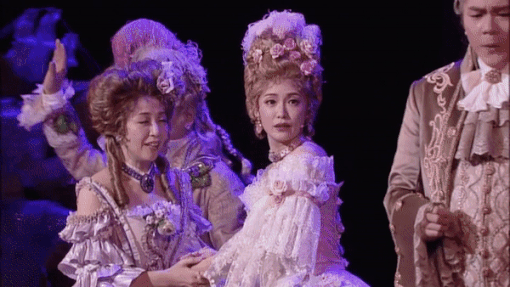
Something else that adds depth to her character as opposed to her 1789 counterpart is that as the story progresses, Marie actually grows. She becomes more mature and more serious, and you see in her how all the events have a clear toll on her. From her own perspective, she really was trying very hard, but anything she tried was inadequate to improve the situation. What she didn’t know is that no matter how hard she tried, the situation was already un-salvageable before she was even born. The populace AND the court had already decided to hate her for being an unintelligent foreign woman from an enemy state, after all. This is an insight most historians nowadays agree on.
In a later scene where Margrid confronts Marie, she asks the Queen: “what makes you think you are better than us?” Marie confirms nor denies, but replies: “I am merely Queen as I was appointed by God.” When she adds: “All I know is duties, you are free,” there is also a clear sense she genuinely doesn’t know why she was appointed by God, but as she is now, all she can do is her best. She is still ignorant, which was a genuine problem about her. She does not know the hardships of not being from the top rank, allowing her say something as insensitive as: “at least you’re free.” But again, despite her ignorance, her feelings are sincere. From all the unfair expectations she was made to live up to from age 14, you really do see why ‘a life without duties’ seemed so much more appealing to her.
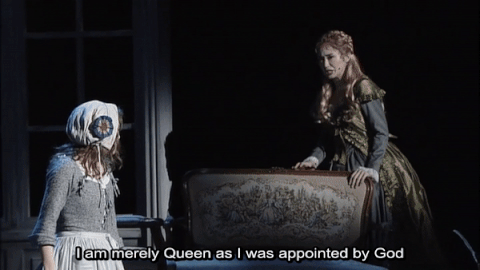
1789 - The Lovers of the Bastille
Marie in 1789 is more of a side-character, and the musical itself just is not very character/story driven as MA is. 1789 has the tendency to take the tropiest of tropes and stay on surface level with the characters. Ouki Kaname is an incredibly good actress and she tries her best; but she cannot do more than the script gives her to work with.
In this musical Marie is not portrayed in a very relatable or sympathetic light. She is extravagant because she has escapist fantasies, but we don’t really see what she’s escaping from. The sympathy from the audience is supposed to be drawn from the tragedy that she’s married to the King but is in love with Fersen. Oh, and she has a son but he’s mortally ill. Meanwhile however, you don’t see how her life is so bad she needs to escape... and you also don’t see Marie really being worried about her son than an occasional: “Oh Ill again? Sucks I guess. Gotta cry my eyes out on my lover’s lap, AHHH FERSEN 💗” It was not until her son had already died that Marie woke up, but the lack of portrayal of Marie’s perspective and the pacing really makes one legitimately wonder whether the child did not just die of Marie’s neglect. And about the forbidden love ...we’ve seen enough love triangles with star-crossed-lovers... I don’t know about you guys, but I am numbbbbb to this “problem”.
When Marie receives message from Olympe that she finally gets to meet her lover after a long separation at the Palais Royal, one of the first things she says is: “is that not the place where revolutionaries and prostitutes are gathered?” This immediately sets up an empathy-barrier between her and the common people. This Marie clearly views herself too good for people who do anything to get by; why would you care about her then? Because Marie’s story is not fleshed out you don’t see parts that can make you go: “oh, the revolutionaries really hate her for reasons beyond her control, she is in danger.” Or “she was raised by a puritan society, making her hate on sex-workers; that’s part of her character flaw.” Instead it’s just this Diva being quite judgemental.
Ouki was trying very hard to make the focus about her own safety, but with the script being what it is... she’s still a mostly unsympathetic character who is a martyr of forbidden love.
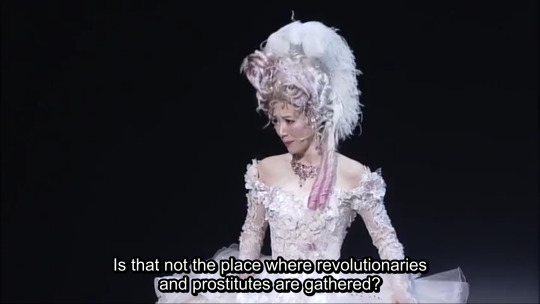
There is one scene where we see her take on a much more mature and responsible role. That was the first time I personally felt like Marie from 1789 is an actual human being with feelings and personal difficulties. But in great part this is Ouki’s acting... (the other cast didn’t do much for me). What is also important is that Marie was ‘humbled’ because her son died. Marie did not have much of a personal growth, and then she changes to a more sympathetic person because of an external factor just... feels less earned.

In the finale Marie appears again in her execution clothes, and the way Ouki appeared really felt like a punch in the gut. She sings “as a recompense for our griefs, people have learnt forgiveness.” However, the story skimped over the characters so much I was left to wonder: “who learned to forgive whom?” Do you think the people forgave you? Or was there somebody you hated but now learned to forgive? What was your grudge? Do you understand the angry mob’s grudge?
The finale of the musical treats like after the heroic sacrifice of the protagonist (Ronan) the oppressive monarchy was replaced by a good democracy, and a Reign of Terror will DEFINITELY not happen under Robespierre or something. But if you’ve had a BIT of European history you just know it’s a blatant lie. So the finale just feels too simplistic, and this simplistic feeling was in part presented by Marie’s very empty, lip-service-y line.

⚔️Hans Axel von Fersen⚔️
M.A. 2018
Fersen is a bit harder to compare which version is better, because honestly, depending on who plays Fersen in MA, Fersen is either the most generic Hollywood sweeping-lover-hero, or a diamond mine to excavate. In the same post linked above by my friend, she explains in detail the differences between TashiroFersen and FurukawaFersen. K-musical fans, don’t @ me, but from what I can tell, the Korean Fersens are also very... typical.
In this post I have discussed Furukawa’s Fersen in great detail, so I shall skip over these for this post. But to summarise, when portrayed by Furukawa at least, Fersen in MA is very nuanced and restrained. Even if we do not fully credit Furukawa however, then at the very least the script allows enough space and material for an actor to flesh him out so phenomenally well (I think Tashiro and some other actors just.... really missed out on the potential).
Fersen in MA incredibly memorable because the main atmosphere of the imminent doom awaiting everyone is carried by him in a way nobody else does. The moment Fersen enters you feel the tension that the musical wishes to tell. Fersen has seen revolutions, he’s seen the power of anger; he knows shit is going to hit the fan because he’s familiar with this trajectory.
Fersen has excellent self control because he knows how a lack thereof would hurt Marie’s reputation and escalate the growing chaos. You can see very clearly how Fersen does want the intimacy, but to him duty and the grander picture has priority. In all the small actions from Fersen you see how he is a savvy intellectual through and through. (More about reservation later).
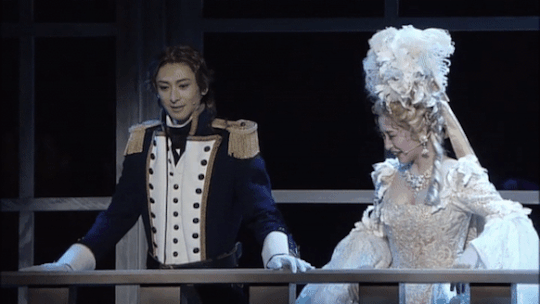
In contrast to 1789, we also get to see so much more of Fersen in MA because he is the narrator and a main character. Throughout the musical he’s been trying to de-escalate the chaos and even though his plans were actually well thought-out, the problems were just simply too big for any one person to solve. When Fersen mourns Marie there is a clear sense that he is not really surprised, just really upset that things had to come so far. Instead of singing something accusatory to the angry and hungry people, he sings: “fate, why did you give her everything, only to show her hell in the end?” Fersen truly understands why the people were duly angry, but that not taking away his sorrow of losing Marie who he knows is a better person than people make her out to be.

Also in great contrast to 1789, the finale of MA is rather grim. It does not suggest hope or that all problems will eventually disappear. The story for these people have ended, but the problems and the world will continue to our days, and days far beyond ours. It gives a feeling that the world of MA is so extensive that we - the audience - are part of it. In the finale when we see Fersen again, he also stays in tune with this feeling. “How can the problems of the world be solved, what is true justice? We remain clueless” he sings, and the way he looks into the unknown distance is almost a reminder to us that nobody has reason to stop worrying and fight for justice.
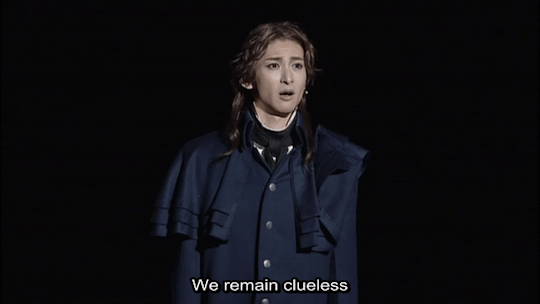
1789 - the Lovers of the Bastille
Now if we were to compare MA’s Furu Fersen to 1789′s Fersen, we see a stark contrast between the two. Where Furusen was incredibly reserved and hyper aware of everything, 1789′s Fersen is just the over-romantic lover who had been pining for his love. For a moment Marie realises she probably should not be cheating on her husband and backs away. Fersen however, is the one to make further advances, actively pulling her back to his side.

When he embraces Marie you see how he is just dreaming and indulging, something Furusen would never do. Furusen might hug Marie, but not without sh*tting 50 colours. 1789′s Fersen is the sweeping Romeo that most of history makes him to be, and little more. But again, Fersen plays but a very small role in 1789, so it is also unfair to compare him to MA’s Fersen.
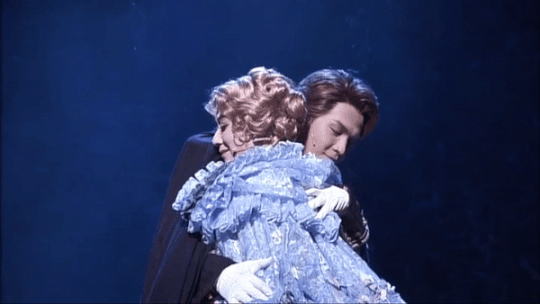
Regardless of whatever nuance might or might not be there however, it is also just quite hard to like this Fersen because he is ‘just another privileged aristocrat who is just needy’. When making out with Marie in Palais Royale they find out that Ronan fell asleep there drunk. Ronan simply complained that Marie was too loud and woke him, and Fersen immediately shuts him up, and then draws his sword at him for ‘speaking rudely’.
First of all Fersen and Marie, if you’re gonna do a clandestine meeting, you CHECK your surroundings. Second of all, FERSEN Ò.Ó, this peasant is untrained and weaponless; you can’t just unleash your high-ranking martial arts at him with a shiny sword. This is EXACTLY the reason the revolution happened; the people were sick of the suppression of the powerless by the powerful. UGHUM. It truly is mind-blowing to consider how 1789 Fersen and MA Fersen are both...Fersens.
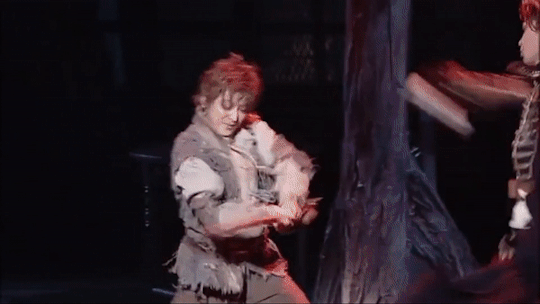
This Fersen is not very involved with the revolution from either side. He just proposes to help Marie and the King escape once, but got dismissed immediately. The following time we see him it is in the finale.
There he stands, a knight in shiny armour singing a really hopeful phrase to a relatively upbeat and hopeful music: “do not rely on force, but seek for hope and courage.” Here again unlike with MA’s Fersen, you don’t really feel like this Fersen has experienced anything. It was like he was an employed special guard, told by his boss there’s nothing he needed to do, his boss is dead, and oh wellll, moving on!

Conclusion
Because Marie and Fersen in MA are main characters whose stories are fleshed out, it really is very unfair to compare them to their 1789′s counterparts in a race of ‘who is better’. In the end of the day, 1789′s aim is to sell a spectacle, and it realllly is a phenomenal piece if you’re there for the spectacle. The choreography, songs, stage, everything is masterpiece-level. So if you’re there for the spectacle you get exactly what you went there for. The story and characters however... not so much. If one is more drawn to a direct, glittery spectacle with hands-down-amazing-songs however, they’d probably find Marie and Fersen from 1789 more enjoyable. If you’re into first and impressive impressions, the MA counterparts might demand a BIT too much attention and patience to get into.

Related posts:
Introduction and character analysis Fersen ‘MA’ 2018
Comparative commentary on MA Cast M and Cast A
#Marie Antoinette#Hans Axel von Fersen#Fersen#MA#1789#comparative commentary#TOHO#musical#1789 les amants de la bastille
32 notes
·
View notes
Text
Septima Poinsette Clark

Septima Poinsette Clark (May 3, 1898 – December 15, 1987) was a black American educator and civil rights activist. Clark developed the literacy and citizenship workshops that played an important role in the drive for voting rights and civil rights for African Americans in the Civil Rights Movement. Septima Clark's work was commonly under-appreciated by Southern male activists. She became known as the "Queen mother" or "Grandmother" of the Civil Rights Movement in the United States. Martin Luther King, Jr. commonly referred to Clark as "The Mother of the Movement". Clark's argument for her position in the Civil Rights Movement was one that claimed "knowledge could empower marginalized groups in ways that formal legal equality couldn't."
Biography
Early life
Clark was born in Charleston, South Carolina, in 1898. Her life in Charleston was greatly affected by the era of Reconstruction, as well as power relations during the time. Charleston was strictly segregated and harshly divided by class. Her father, Peter Poinsette, was enslaved at birth on the Joel Poinsett farm between the Waccamaw River and Georgetown. Joel Roberts Poinsett was a distinguished US politician of his time and the namesake of the Poinsettia plant. Peter was a house servant to Joel and his main task was taking the children to and from school each day. After slavery, Peter found a job working on a ship in the Charleston harbor. During one of his travels, he went to Haiti and it was then that Peter met Victoria, Clark's mother. The couple got married in Jacksonville, Florida and then moved back to Charleston.
Her mother, Victoria Warren Anderson Poinsette, was born in Charleston but raised in Haiti by her brother, who took her and her two sisters there in 1864. Victoria Poinsette had never been enslaved, and vowed to never be anyone's servant. She returned to Charleston after the Civil War and worked as a launderer. She raised her children very strictly, only permitting them to play with other children on one day of the week. She was also determined to make her daughters into ladies, so she told them never to go out without gloves on, never yell, never eat on the street, etc. Victoria Warren Anderson Poinsette lived in a constant struggle of wanting to improve her social class; she wanted to live in a middle-class society but on a working-class budget. Victoria made it plain to Peter that he was not providing enough for her and their family. Victoria raised her children separated, with the boys having more lenient rules than the girls. The boys could have friends over and play many days of the week, but the girls had to do chores and lessons, every day other than Friday. Clark rebelled against her mother's strictness through never becoming the lady she wished her to be and marrying a man Victoria called a "stranger". Clark remembers only ever being punished by her father when she did not want to attend school; however, Clark's father was not able to write his own name until the later years of his life.
Clark's first educational experience was in 1904 at age six, when she started attending Mary Street School. All Clark did at this school was sit on a set of bleachers with a hundred other six-year-olds, learning nothing. Clark's mother quickly removed her from the school. An elderly woman across the street from their house was teaching girls, so Clark learned to read and write there. Due to Clark's poor financial status, she watched the woman's children every morning and afternoon in return for her tuition. At this time there was not a high school in Charleston for blacks, however, in 1914 a school opened for blacks in 6th, 7th, 8th grade. After sixth grade, she took a test and went on to ninth grade at the Avery Institute. All of the teachers were white women, whom Clark admired. In 1914, black teachers were hired and this brought much controversy to the city, which Clark later took part in through the NAACP.
Clark graduated from high school in 1916. Due to financial constraints, she was not able to attend college initially, so she took a state examination and began working as a school teacher on John's Island at the age of eighteen. She taught on the islands from 1916 to 1919 at Promise Land School and then returned to Avery from 1919 to 1920. She was able to return to school part-time in Columbia, South Carolina to complete her B.A. at Benedict in 1942 and then she received her M.A. from Hampton. As an African American, she was barred from teaching in the Charleston, South Carolina public schools, but was able to find a position teaching in a rural school district, on John's Island, the largest of the Sea Islands. During this time, she taught children during the day and illiterate adults on her own time at night. During this period she developed innovative methods to rapidly teach adults to read and write, based on everyday materials like the Sears catalog.
Clark recalls the gross discrepancies that existed between her school and the white school across the street. Clark's school had 132 students and only one other teacher. As the teaching principal, Clark made $35 per week, while the other teacher made $25. Meanwhile, the white school across the street had only three students, and the teacher who worked there received $85 per week. It was her first-hand experience with these inequalities that led Clark to become an active proponent for pay equalization for teachers. In 1919 her pay equalization work brought her into the movement for civil rights. In an interview with Robert Penn Warren for the book Who Speaks for the Negro?, Clark explains how these experiences with her education, as well as her early experiences with growing up in a racist Charleston and teaching in the slums, prompted her to want to work towards civil rights.
NAACP involvement
Clark first heard of the NAACP while she was teaching on John's Island from 1916 to 1919. There was no NAACP chapter on John's Island, but a meeting was held in which various preachers came and spoke about what the NAACP was and what exactly it was trying to do. The superintendent was in attendance to collect dues and it was then that she decided to join the organization. In 1919, Clark returned to Charleston to teach sixth grade at Avery Normal Institute, a private academy for black children. In Charleston, she joined the Charleston Branch of the NAACP and began attending meetings regularly of the National Association for the Advancement of Colored People (NAACP). Under the guidance of Edmund Austin, the President of the local NAACP in Charleston, Clark took part in her first political action with the NAACP in Charleston. Despite the orders of her principal, Clark led her students around the city, going door-to-door, asking for signatures on a petition to allow black principals at Avery. She got 10,000 signatures in a day, and in 1920 black teachers were permitted. In 1920, Clark enjoyed the first of many legal victories when blacks were given the right to become principals in Charleston's public schools, under the education board of aldermen of Charleston. Her participation in the NAACP was Clark's first statement in political action. In 1945, Clark worked with Thurgood Marshall on a case that was about equal pay for white and black teachers led by NAACP in Columbia, South Carolina.
The late-1940s proved to be a difficult time for Clark as she stood up for the NAACP's aim of equalization to integration against many other members and activists.
Marriage and children
While teaching at Avery from 1919 to 1920, Clark met Nerie David Clark. He worked as a warden cook on a submarine in the navy during World War I. In late 1920, she went to teach in McClellanville until 1922. She and Nerie wrote letters back and forth and dated for approximately three years and got married in 1923. They got married in McClellanville and then shortly moved to Hickory, North Carolina, Nerie's hometown. Clark's mother was disgraced by her marriage. Victoria believed that to marry any man outside of the state is to marry a stranger. She refused to have her in-laws for dinner or for any occasion. The marriage severed Victoria and Septima's relationship. While living in Hickory with Nerie's family, Clark became aware of the many cultural and ideal differences they had. They grew up in different worlds; a mountain man and a low-country girl. In Hickory, Clark attended the church Nerie's family did, which was an African Methodist church. She found this church to be much more of a community than her church in Charleston, the United Methodist Church. Throughout Clark's religious journey in life, she found there are many ways to serve God, rather than only one correct way. Clark got homesick, so they moved back to Charleston, where she taught at Promise Land again from 1926 to 1929. In Charleston, they had their first child, which died. Clark viewed the death of her baby as a punishment to her because she married a man not from South Carolina. Her mother was not sympathetic and refused to help her; however, her father was friendlier towards her. To get over her lost baby, she took a job with a white woman for a summer. They stayed in the mountains for the summer and the woman was helpless, which gave Clark optimism and hope. She then moved to Columbia and began teaching in 1929. It was in Columbia she got much more involved in civic activities.
She settled in Columbia, South Carolina in 1929, and accepted a teaching position that year. In total, Septima Clark spent a total of 17 years in Columbia, South Carolina. Much of her work there is documented by the University of South Carolina History Department which, under the direction of B. J. Donaldson, has conducted extensive research on African-American education, with special emphasis on the history of the Booker T. Washington High School. In 1929, Septima Clark was employed at Booker T. Washington where she is still remembered as an outstanding educator. She worked closely with the principals of Booker T. Washington High School, both C. A. Johnson who recruited her for the teaching position she would hold for 17 years and later with J. Andrew Simmons, who was originally from Charleston and whom she may have known previous to their working together in Columbia. While in Columbia, Septima Clark completed the foundations upon which her career, reputation, and memory would rest: she became a highly valued faculty member at Booker T. Washington High School, she completed her bachelor's degree at Columbia's Benedict College, and she completed her graduate studies at New York's Columbia University and Atlanta's Clark College. The level and quality of the education that Septima Clark achieved was typical of what was required by the administrators of the Booker T. Washington High School of Columbia who recruited highly trained teachers from all over the country. After J. Andrew Simmons left Booker T. Washington High School to take a position in New York in 1945, Septima Clark stayed on for two additional years, before finally leaving Booker T. Washington High School, an institution she had helped to mold, in order to return to Charleston, SC, to take care of her ailing mother, Victoria.
During this time, Clark had trouble providing for Nerie, Jr. In 1935, she decided to send him back to Hickory to live with his paternal grandparents. Clark's decision to send Nerie, Jr. to live with his paternal grandparents was a common action at this time due to the Great Depression and its resulting financial issues. Septima Poinsette Clark's marriage to Nerie David Clark resulted in a course of depression for Clark, as well as a significant decline in her self-confidence.
Columbia University and NAACP leadership
During summers, Clark began studies at Columbia University in New York, and at Atlanta University in Georgia with the landmark figure in the racial equality movement, W. E. B. Du Bois. Between 1942 and 1945, she received a bachelor's degree from Benedict College, Columbia, SC and a master's degree from Hampton (Virginia) Institute (now Hampton University). While earning her B.A., she was taking classes in the morning, teaching from noon to five in the afternoons, and taking more classes in the evenings. She was earning $62.50 per month in college and every summer she traveled to Maine to earn more money. The NAACP in Columbia, SC, had approximately 800 members and all were black. The biggest NAACP impact during Clark's time in Columbia was they sponsored a suit that won the equalization of teacher salaries. It was a huge win for the NAACP. In 1947, Clark returned to Charleston to take care of her mother who had had a stroke. While caring for her mother Clark's role as an educator and activist did not subside. During this time, she taught in the Charleston public schools, she was active with the YWCA, and served as membership chairperson of the Charleston NAACP. The YWCA was one of the few organizations in Charleston that was interracial. There were black and white branches. In 1956, Clark obtained the position of vice president of the Charleston NAACP branch.
That same year, the South Carolina legislature passed a law banning city or state employees from being involved with civil rights organizations. Clark believed that a combination of relations, such as social and power relations, were a major contributor to schooling. Clark was upfront in her refusal to leave the NAACP, and was thus fired from her job by the Charleston City School Board, losing her pension after 40 years employment. She soon found that no school in Charleston would hire her. A black teachers' sorority held a fundraiser for her benefit, but no member would have their picture taken with her, fearing that they would lose their own jobs.
Highlander Folk School literacy courses
Around this time, Clark was active with the Highlander Folk School in Monteagle, Tennessee. She first attended a workshop there in 1954. Myles Horton, the founder of Highlander, quickly hired her as the full-time director of workshops. Before long she was teaching literacy courses, drawing on her experience on John's Island. "In a compressed week's workshop, Clark promised to turn sharecroppers and other unschooled Negros into potential voters".
Highlander was one of the few interracial schools in the South at the time and Clark prospered as a teacher there. After being fired and unwelcomed in her hometown, Clark found Highlander to be a great community.In 1959, while she was teaching at Highlander she was arrested for allegedly "possessing whiskey"; however, these charges were later dropped and seen as false.
Clark and her cousin, Bernice Robinson, expanded and spread the program. They taught students how to fill out driver's license exams, voter registration forms, Sears mail-order forms, and how to sign checks. Clark also served as Highlander's director of workshops, recruiting teachers and students. One of the participants in her workshops was Rosa Parks. A few months after participating in the workshops Parks helped to start the Montgomery Bus Boycott. Many other women who took part in the Montgomery Bus Boycott also attended Highlander and participated in Clark's workshops. Upon seeing the success of Clark, Ella Baker traveled to Highlander as a representative of SCLC and observed to see if Clark's program could be incorporated into SCLC's Crusade for Citizenship.
The spread of Citizenship Schools
Clark is most famous for establishing "Citizenship Schools" teaching reading to adults throughout the Deep South, in hopes of carrying on a tradition. The creation of citizenship schools developed from Septima Clark's teaching of adult literacy courses throughout the interwar years. While the project served to increase literacy, it also served as a means to empower Black communities. Her teaching approach was very specific in making sure her students felt invested in what they were learning, so she connected the politics of the movement to the needs of the people. She was not only teaching literacy, but also citizenship rights. Clark's goals for the schools were to provide self-pride, cultural-pride, literacy, and a sense of one's citizenship rights. She was recruiting the rural communities to get involved with the movement. Citizenship schools were frequently taught in the back room of a shop so as to elude the violence of racist whites. The teachers of citizenship schools were often people who had learned to read as adults as well, as one of the primary goals of the citizenship schools was to develop more local leaders for people's movements. Teaching people how to read helped countless Black Southerners push for the right to vote, but beyond that, it also developed leaders across the country who would help push the civil rights movement long after 1964. The citizenship schools are just one example of the empowerment strategy for developing leaders that was core to the civil rights movement in the South The citizenship schools are also seen as a form of support to Martin Luther King, Jr. in the nonviolent Civil Rights Movement.
The project was a response to legislation in Southern states which required literacy and interpreting various portions of the US Constitution in order to be allowed to register to vote. These laws were used to disenfranchise black citizens. Citizenship Schools were based on the adult literacy programs Clark and Robinson had developed at Highlander. They required a week's worth of training in a program that was ultimately designed by Clark. Septima Clark hired her cousin Bernice Robinson, to be the first teacher. Bernice was also a Highlander alumna. In addition to literacy, Citizenship Schools also taught students to act collectively and protest against racism.
The leadership schools ultimately spread to a number of Southern states, growing so large that, upon the recommendation of Myles Horton and Clark, the program was transferred to the Southern Christian Leadership Conference (SCLC), in 1961 though initially Martin Luther King, Jr was hesitant about the idea. Transferring the program to the SCLC was also a result of financial troubles at Highlander Folk School in Tennessee. With the increased budget of the SCLC, the citizenship school project trained over 10,000 citizenship school teachers who led citizenship schools throughout the South, representing a popular education effort on a massive scale On top of these 10,000 teachers, citizenship schools reached out and taught more than 25,000 people. By 1958, 37 adults were able to pass the voter registration test as a result of the first session of community schools. Before 1969, about 700,000 African Americans became registered voters thanks to Clark's dedication to the movement. Clark came to national prominence, becoming the SCLC's director of education and teaching. Clark was the first woman to gain a position on the SCLC board. Andrew Young, who had joined Highlander the previous year to work with the Citizenship Schools, also joined the SCLC staff. The SCLC staff of citizenship schools were mainly women, as a result of the daily experience gained by becoming a teacher. Clark would struggle against sexism during her time on the SCLC, as had Ella Baker, with the bulk of sexism emanating from Martin Luther King, Jr. Ralph Abernathy also objected to her, as Clark said, "I can remember Reverend Abernathy asking many times, why was Septima Clark on the Executive Board of the Southern Christian Leadership Conference? And Dr. King would always say, 'She was the one who proposed this citizenship education which is bringing to us not only money but a lot of people who will register and vote.' And he asked that many times. It was hard for him to see a woman on that executive body." Clark claimed that women being treated unequally was "one of the greatest weaknesses of the civil rights movement."
Other civic service
During her career in service organizations, she also worked with the Tuberculosis Association and the Charleston Health Department. She was also an active member of Alpha Kappa Alpha sorority. Clark retired from active work with the SCLC in 1970. She later sought reinstatement of the pension and back salary that had been canceled when she was dismissed as a teacher in 1956, which she won. She was later to serve two terms on the Charleston County School Board.
Death and legacy
In 1978, Clark was awarded an honorary doctorate of humane letters by the College of Charleston. U.S. President Jimmy Carter awarded Clark a Living Legacy Award in 1979. In 1987, her second autobiography, Ready from Within: Septima Clark and the Civil Rights Movement (Wild Trees Press, 1986) won the American Book Award.
Septima P. Clark died December 15, 1987. In a eulogy presented at the funeral, the president of the Southern Christian Leadership Conference (SCLC) described the importance of Clark's work and her relationship to the SCLC. Reverend Joseph Lowery asserted that "her courageous and pioneering efforts in the area of citizenship education and interracial cooperation" won her SCLC's highest award, the Drum Major for Justice Award. She is buried at Old Bethel United Methodist Church Cemetery in Charleston, South Carolina.
Clark had major relations to other black activists of the Civil Rights Movement, such as Booker T. Washington and W. E. B. DuBois. Washington and Clark both emphasized the importance of self-improvement before the importance of institutional reforms. DuBois and Clark agreed on the emphasis of education as the most important approach to the civil rights movement.
Septima Clark Public Charter School in Washington, DC, is named in her honor.Septima P. Clark Parkway (also known as the Septima P. Clark Expressway) and Septima P. Clark Memorial Park in Charleston, SC, are named in her honor.
Minor planet 6238 Septimaclark, discovered by Eleanor Helin is named in her honor. The official naming citation was published by the Minor Planet Center on 8 November 2019 (M.P.C. 117229).
Quotes
I have a great belief in the fact that whenever there is chaos, it creates wonderful thinking. I consider chaos a gift.Don't ever think that everything went right. It didn't.This country was built up from women keeping their mouths shut.I never felt that getting angry would do you any good other than hurt your own digestion- keep you from eating, which I liked to do.
Autobiographies
Septima Clark wrote two autobiographies during her lifetime, in which she recorded her lifelong experiences. The first, written in 1962, was named Echo In My Soul. It is a combination of her life story, as well as her work at the Highlander Folk School. The work also discussed her views concerning the Jim Crow laws and the legitimacy of the Civil Rights Movement. Clark's second autobiography, Ready from Within (1979), was an oral recollection of lifelong experiences.
77 notes
·
View notes
Text
Animation Winner and BEST SAILOR MOON ANGST
Anyway, without further ado, the winner for Animation Day of Eight Days is:
A PLACE FURTHER THAN THE UNIVERSE
Which actually had a pretty decent margin over the second-place winner, Rose of Versailles.
And now, the finest artisanal Angsty Sailor Moon Headcanons, FOR ENTRIES.
Pluto-It’s hard to get close to people when you know everything they will do, but nothing about how they will feel. There’s always the feeling that everything you do is kinda pointless, because you know what will happen to them and don’t know if what you do will change it, for good or bad. You can just withdraw from everyone to the gates of time and do your duty, but then you feel like you are missing chances to make other people or yourself happy. Trying to make friends with people you don’t know everything about is weird after knowing everything that will happen to everyone else, but you have to push through and hope for the best. You talked to usage about this and she suggested you get a pet, because “ they will defiantly love you if you are nice to them!”. So now it’s just you and Cheddar, that big orange idiot cat you saw in the shelter that the staff said was very loving, if he learned to trust you, in a small apartment above a laundromat. --- BeefSalad33 (Love some PLuto angst!)
Sometimes, Makoto has to take a break from having her friends drop by for dinners or snacks or anything else. She leaves her door locked, pretends she's not home, and does what she can to pretend she's normal when she has to be at school or work. It's both everybody's and no one's fault.
When they stay too late into the night and all pass out before skittering away one by one in the morning. When a monster attacks just as everyone's halfway through their meal, and all feel too drained to go back to a party after the fight. When someone had a tantrum and killed the buzz- often early on, not so much after a few months but never *never* happening. Those times, Mako came back to an empty apartment, messy with life, and fear, dread, anger, emptiness all flooded over her.
She'd be that little girl again, pulled from class. Putting things in order for family to come over, not really knowing why, all by herself. Watching practical strangers, known only to her blood, go through the papers her mother carefully kept. Arguing with those strangers over if her father's weird travel keepsakes could be sold, not being able to say why except by a stomp of her foot and "It's ours! It belongs here!" She'd be that small girl, alone, tired, fumbling through things she'd half-watched her mother do when she wasn't parroting the heroes on tv.
She'd be abandoned.
So Mako took a week, a couple days, once it was a mere lucky hour, to wallow in it like she wouldn't let herself do anything else. She'd be that girl, for a time, and then come back to herself when the seventh knock on her door that day became a reminder: she wasn't abandoned. Her friends would come back.
She just had to get ready for them. --- @katrani (I don’t really get into Mako--not out of dislike, just, I don’t, but this was GREAT)
Sailor Senshi: since the beginning of time, the Senshi have always given their entire life and soul to their service. When a Senshi dies (regardless whether in battle or of old age), their soul/essence/power is absorbed into the power of that Senshi. When the next person takes up the mantle, they are slightly stronger than the previous incarnation. Even Pluto, eternal Sentinel, has no idea how many previous versions of Pluto had previously held the post and now reside in her staff to power her. Michiru alone has a premonition of this fate, and she is never quite sure if it is kindness or cruelty to not tell Haruka of their eventual fate. --- @amberlilly (mmmmmmmm love and find delicious when they cannot escape the moon even in death FEED ME)
MAS, when Haruka is at her worst, determined to walk again and hurting herself in the process, spiraling, not being there for the kid she always wanted, convinced she has no life or worth without her legs and speed and 'independence,' as Michiru seriously begins to consider and draw up paperwork for a divorce, she dreams of that first battle. Michiru Wanting and Deciding that she deserves as least a companion in the hot butch who she doesn't realize she'll come to love so much. Fate would allow her this small pleasure. She remembers tipping the scales and forcing Haruka's hand with the transformation ring, sealing a fate she needn't have ever had to have. Michiru wakes up crying. She thinks maybe bc of all this it would be selfish to divorce now even though during better moments she knows it's best for M.A. But to escape the pain of watching the person she chained to her fate suffer under its weight. Well she might still be that selfish creature and leave Haruka instead of bear witness. --- @thoughtfulfangirling (This is ALMOST cheating, but this is my x2 points winner, as believe it or not, I have never connected everything that goes wrong in MaS with the idea that MIchiru manipulated Haruka into taking on the mantle of Senshi. INCREDIBLE! ACE HIGH!)
Mina understands swords. She can wield a rapier, or a broadsword, or a stone greatsword as if it is an extension of her arm. She has an instinctive feel for when to slice, when to hack, and when to stab. She weighs up her enemy's strengths and weaknesses and reaches for the correct tool without even looking. But when you are a hammer, everything becomes a nail; when you are a general, everyone becomes a sword. Mako is a claymore, heavy, unsubtle, made to do heavy damage. Michiru is a dagger, secretly fatal, poison tipped. Rei is a katana, elegant, swift, light. Ami is a rapier, precise, strategic. And Haruka. She had been unsure of Haruka, but when she saw the still body and the glowing sword above it, she knew it could never have been anything else. Haruka is a curved saber. Slicing rapidly through the enemy, always on the move. Minako knows that no matter how fond of a weapon she is, she cannot use it gently, or hesitate to break it, or leave it behind, if necessary. And Minako always knows which sword is best for any battle. And when you are a general, everyone is a sword. ---- @incorrecttact (This almost got a pass from me for not angsty until I saw the bit about Minako being fond of a weapon but having to willing to break it or leave it behind and YES)
THANK YOU ALL FOR MAKING MY PAPERWORK MORE FUN
7 notes
·
View notes
Text
TAFAKKUR: Part 331
SYMMETRY, ASYMMETRY, AND SUPERSYMMETRY: Part 1
Scientists have discovered that nature contains symmetry in such things as butterflies, snowflakes, and faces, as well as in its own laws. They also have discovered that at particular points, symmetry ends and is replaced by asymmetry. In the 1970s, supersymmetry entered scientific terminology, and physicists began to develop theories to justify it. This article discusses how the universe would drift into chaos without symmetry, and attempts to answer: Why does the universe behave in the same way at every instant and at every point in space“time? Why is it accessible to us through laws? Modern materialistic science has not answered such questions. In addition, other issues will be addressed: What is the consequence matter“antimatter asymmetry? Does time really flow from past to future? What is supersymmetry?
WHAT IS SYMMETRY?
Physicists usually define symmetry as the invariance under transformation. Simply put: Remaining unchanged after a change. The basic example is time“translation invariance, which states that the homogeneity of time symmetry leads to the invariance principle that nature's laws always remain the same Thus, they are independent of when we measure them.
Let's assume that we measure and record a pendulum's movement today. If we do this tomorrow or even next week under the same conditions, we always will obtain the same result. Without symmetry's principles, for instance the time“translation invariance, a computer built today most probably would not work tomorrow. We could not even build a computer, a calculator, or a watch, for nature's laws would be in a state of random change at every moment. Nor could we guarantee that gravity would not turn into a repulsive force in the next moment.
Another basic example is the space“translation invariance. Space has the symmetries of homogeneity (being the same at every location) and isotropy (being the same in every direction). As a result, laws are independent of where we measure them, for whether we are in America or China, we use the same formulae: F= m.a, S= k.log W, E= m.c ...
WHY DOES THE UNIVERSE BEHAVE THE SAME AT EVERY INSTANT AND AT EVERY POINT IN SPACE“TIME?
Materialists reply: Because laws under space“ time translations are invariable. This will bring another why, answered by: Because of homogeneity and isotropy. Such a pattern will continue, for each question is no more than an effect ready to be explained by a cause, and each answer (cause) will appear to be another cause's effect.
Followers of Aristotle, Plato, Ibn-i Sina (Avicenna), al-Farabi (Al-Pharabius), or the Illuminist philosophers will urge you to keep asking why. The point at which you stop asking will be your destination, where you reach the initiator: God. All answers to your previous questions, when taken together, turn out to be attempts to attribute intermediaries or partners to God. If you ask those who believe in God's Oneness and give causes no share in His Dominion, you will hear: The same laws, being seen at every point and at every instant, can be explained only if there is one God governing every point at every instant with His universal Will, absolute Power, and all-encompassing Knowledge. Thus all causes, bound to each other so that they can be understood, are bound directly to God, Who is not bound by space“time.
WHY IS THE UNIVERSE ACCESSIBLE TO US THROUGH LAWS?
While new symmetries were being revealed, skeptical scientists were wondering whether symmetry in nature's laws on a macroscopic scale is valid on a microscopic scale.
Every symmetry is associated with a conservation law, the most important one being energy conservation. This implies a symmetry in time-translation. The validity of energy conservation has been proven on the microscopic level. One of the latest verifications is that in a perfect vacuum, particle and antiparticle pairs are created and annihilated constantly. In other words, microsized Big Bangs occur all the time out of the vacuum. This does not violate energy conservation or the laws of quantum mechanics. If they were somehow violated, and if we did not see the same concepts as the result of symmetries, the similar formalism, and the same techniques from micro- to macroscales, we could not comprehend the universe.
Consider Einstein's amazement at this: The most incomprehensible thing about the universe is that it is comprehensible. Even the most atheistic scientist accepts that the universe is not absurd. But why is universe comprehensible and accessible to us?
Atheists and materialists believe that we come into being from nothing, by nothing, and for nothing, and so consider such questions meaningless. However, people who unify everything in God's name can assert: God cannot be comprehended fully by humans, and so wills to be comprehended and known through His art and the system and order apparent in the form of laws. We are here to comprehend, and the universe lies open. In the words of Paul Davies, author of The Mind of God, we are meant to be here.
WHAT IS THE CONSEQUENCE OF THE MATTER“ANTIMATTER ASYMMETRY?
Existing theory says that every particle has a corresponding antiparticle. Physicists believe that particle“antiparticle pairs behave symmetrically, like mirror reflections of each other (mirror-reflection symmetry). In 1964 at Doe's Brookhaven Laboratory, when a slight but definite asymmetry between a subatomic particle and its antiparticle was noted, physicists saw the breaking of symmetry in nature. It was time to ask why.
It is now thought that this asymmetry may be responsible for matter's dominance in the universe. Our universe appears to be made entirely of matter. If there were substantial amounts of antimatter on Earth, we would be annihilated as we react with our antiparticles, for particle“antiparticle pairs annihilate each other when reacting and leave behind electromagnetic radiation.
Any explanation offered for this asymmetry must account for the asymmetry in the universe's earlier periods, beginning with the Big Bang. Astrophysicists think that certain massive particles, formed soon after the Big Bang, decayed in such a way that slightly more particles than antiparticles were created. Even though this asymmetry's exact origin is unknown, we do know that if symmetry were not broken, we would not be alive. Amazingly, the laws of physics allow life to exist.
#allah#god#prophet#Muhammad#quran#ayah#islam#muslim#muslimah#hijab#help#revert#convert#religion#reminder#hadith#sunnah#dua#salah#pray#prayer#welcome to islam#how to convert to islam#new convert#new muslim#new revert#revert help#convert help#islam help#muslim help
1 note
·
View note
Text
50 Questions Tag
I was tagged by the lovely @rae-rae-patcha! I’ll tag (with no pressure, obviously!) @demigod-dragonrider-schoolidol @fizzyxcustard and @writefightandflightclub.
Let’s get to know me, and have some fun too! - Nemo __________
1. What color is your hairbrush?
It’s a grey colour, but also a lavender/purple type of grey.
2. Name a food you never eat.
I don’t do anything with blood in it. Also Oysters. I had one of those once and I’ve sworn off them ever since.
3. Are you usually too warm or too cold?
Too cold. My hands and feet are notorious for being cold, but my core temperature has been described as warm. It’s weird.
4. What were you doing 45 minutes ago?
Playing Hide and Seek on Minecraft LMAO
5. What’s your favorite candy bar?
Snickers, or Flake. I like my chocolates, so I can’t really pick one.
6. Have you ever been to a professional sports game?
Nope. Never in my life.
7. What’s the last thing you said out loud?
“Dad, stop!”
8. What’s your favorite ice cream?
RUM AND RAISIN!
9. What was the last thing you had to drink?
W a t e r. Hail Hydration.
10. Do you like your wallet?
I barely use my wallet. It was a gift from my dad literal years ago, and since I got a card I don’t really use it anymore...
11. What’s the last thing you ate?
I wanna say something healthy, but it was actually a Flake Chocolate.
12. Did you buy any new clothes last weekend?
I did not.
13. What’s the last sporting event you watched?
I caught clips of the last Rugby game, I guess that counts?
14. What is your favorite flavor of popcorn?
Salted Caramel.
15. Who’s the last person you sent a text to?
My cousin. I sent her a picture of a castle.
16. Ever go camping?
Not in forever. I really want to go again though. We have some great spots along the coast, and that’s real close. (I live about an hour and a half drive from the start of the Great Ocean Road so I could go. I could even do a day-trip to the Twelve Apostles lol).
17. Do you take vitamins?
I should. But I don’t.
18. Do you go to church every Sunday?
I do. Every sunday.
19. Do you have a tan?
You’d think I would since I live in Australia. But I don’t.
20. Do you prefer Chinese or pizza?
Chinese. Every time.
21. Do you drink soda through a straw?
Yes. I am a child. BUT I do have metal straws now, so I don’t feel guilty about it anymore.
22. What color socks do you usually wear?
Black socks.
23. Do you ever drive above the speed limit?
Sometimes. No.
24. What terrifies you?
Heights. Needles. Wasps. Thunder. In that order.
25. Look to your left, what to you see?
My dining room table.
26. What chore do you hate the most?
Vacuuming. I’d rather wash all the dishes by hand than vacuum a single room in my house.
27. What do you think when you hear an Australian accent?
Uhmm, nothing? Australian accents are just normal accents to Australians. But sometimes you come across a real thick accent, and when I do, I think of my Uncle.
28. What’s your favorite soda?
I like Frozen Cokes. The once you get from Maccas.
29. Do you go in fast food or in the drive through?
Drive Through! COVID-19! We do Drive Throughs!
30. What’s your favorite number?
28. I think that’s a nice number.
31. Who’s the last person you talked to?
My Mumma.
32. Favorite cut of beef?
Idk man. Meat is meat. I’ll eat it all.
33. Last song you listened to?
'Woke the F*ck Up’ by Jon Bellion.
34. Last book you read?
And finished? I can’t remember. I think it was ‘DOGS’ by M.A. Bennett.
35. Can you say the alphabet backwards?
Hell nah. I’m boring like that.
36. Favorite day of the week?
Fridays. There’s some nice relief to Fridays.
37. How do you like your coffee?
Latte with two sugars.
38. Favorite pair of shoes?
I have a pair of black heels with gold studs all over them. They make me feel powerful. I love them.
39. Time you normally wake up?
Eight-thirty-ish.
40. Sunrise or sunsets?
Sunsets. I don’t like getting up early.
41. How many blankets on your bed?
Two. My doona and a throw rug at the foot.
42. Describe your kitchen plates?
My mothers plates. Very cottagecore.
43. Describe your kitchen at the moment?
Neat. but rather empty except for where I am standing now.
44. Do you have a favorite alcoholic drink?
It’s called a ‘Captain Jack Sparrow’. 1 oz Captain Morgan Rum, 1 oz Jack Daniels Whisky, and then fill the glass up with however much Coke you like.
45. Do you play cards?
I do. Last I played I broke my glasses. Cards with my peeps can get pretty wild.
46. What color is your car?
A steel silver colour.
47. Can you change a tire?
I have assisted in changing tires, but never on my own.
48. Your favorite state, province, country, etc.?
I live in Victoria, bu the Northern Territory is so pretty. If you ever go to Alice Springs I highly recommend the Sunset Camel Rides. Its so nice!
49. Favorite job you’ve had?
I was a kitchen hand, and there I get free food from one of the most expensive restaurants in my town.
I also worked with Scaffolding for a while, and I got to help out with getting rid of a beehive. Very cool stuff.
50. How did you get your biggest scar?
My longest scar is on my wrist, it came from a measurement ruler - I scratched myself on it. My biggest one is on my other wrist, an oil burn from when I was cooking once. Hurt like hell.
4 notes
·
View notes
Text
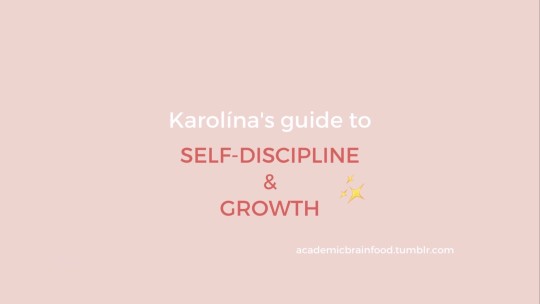
I consider myself a fairly disciplined person, BUT I wasn’t always like this. So here are some tips for you to get on this path, too.
Motivation
The key is finding your goals. Without knowing what you want, you won’t feel motivated and you won’t have any reason to study for that extra hour, wake up earlier or go jogging even though the weather is horrible.
Find a big goal you have in life. I like to call this my global goal since it includes all the other ones and it’s also the direct result of my self-discipline. This can also be very abstract, perhaps kind of a mantra that will accompany you every day. Mine is very basic, simple, but it works - be better. Again, it’s abstract, but it houses all aspects of my life and my other goals, which I call ---
Support goals. These are one level under your global goal. The idea is, that they are concrete but lie somewhere in the future. These are the ones you are working towards on the day to day basis. Examples for them can be your dream profession, your desired GPA, sports milestone, etc.
Stepping stones goals. Finally, we are at the lowest level. These goals are your stepping stones to achieve what you set out for yourself. You have to make them very concrete, this includes planning and maybe even some numbers. For example, setting a goal of going for a run 5 times a week, waking up at 6 am or studying your target language every day for one hour.
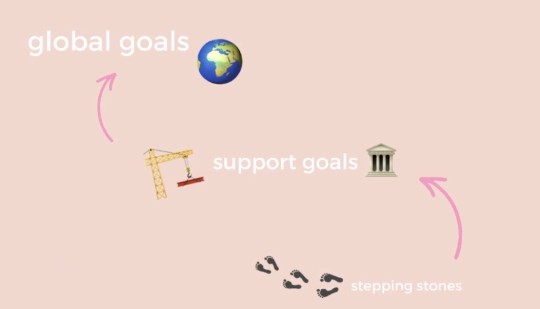
What if you feel unmotivated or don’t see why you should do X?
Change your perspective. Let’s look at this through the lens of uni. This semester, I have to write a lot of essays and hold presentations. I hate doing presentations, BUT on a deeper level, I know it will help me move towards my support goals. So, flip your perspective and see X (whatever you don’t feel like doing) as an opportunity to grow, challenge yourself or better yourself.
This is your life and it’s about you!
Prioritize yourself. A lot of people won’t understand why you are doing what you are doing and that’s okay. It matters to you and that’s the most important thing. A lot of people will want to distract you, laugh at you for studying rather than partying and that’s fine too. At the end of the day, what matters the most is your achievement, not the opinion of others. I love this quote and have it everywhere: “Decide what kind of life you actually want. the say NO to everything else that isn't that.”
What you do for yourself counts the most. To illustrate this, let!s look at student life again. In your B.A./M.A./whatever, everyone has the same opportunities - everyone goes to the same lectures, seminars, tutorials. But what matters is if you do the extra work that will make you better than average. Turn up to the lectures even if you don’t want to, read the books, study for that extra hour, go to office hours. This could go on forever and applies to everything, not just uni. You just have to find the ways.
It’s a choice. At the end of the day, what you do and don’t do is your conscious choice. I could wake up at 8 am every morning and nothing would happen, no one would notice except for me. I could listen to songs instead of a Spanish podcast while getting ready. I could stay in bed when it’s miserable outside and not go running. But I don’t. I choose not to. I actively choose the “harder” path, the challenging one, the one that will help me be better.
How do I get going?
Have a plan. Plan plan plan! Get out your planner/bullet journal/google calendar and plan out your days, weeks, months. Write out all that you want to achieve and how you plan to achieve it. Create deadlines for yourself and hold onto them. I have a 5-year plan, yearly, monthly and weekly goal list.
Create a list of non-negotiables. This applies to your week/month/year. For every day, I have some non-negotiable activities that I HAVE to do - the more you do these, the more unconscious it will be and these will become habits. (I recommend reading some books about habits, I loved James Clear’s Atomic Habits.)
Habit tracker. The most effective way how you can observe and create habits is with a habit tracker. Sometimes the only thing that will motivate me to do X is the thought of another dot in my bullet journal. But I guess you all know about habit trackers!
And some final thoughts:
Observe what the particular activity/habit/etc. does for you. Does it help you? How does it help you? Are you moving towards your goals? At which pace? How can you optimize it?
Not everything is for everyone! Don’t try to fit yourself into someone else’s habits, routines or goals. (If you are a night owl, don’t force yourself to wake up at 6 am because it’s popular!) Make this your own process. This includes some deep learning and figuring stuff out. But that’s okay. Everyone has their own path, pace and we are all very different, constantly evolving and learning. Your goals will evolve with you.
DO NOT COMPARE YOURSELF TO OTHERS. You can have an accountability partner so you can motivate each other. I advise you to surround yourself with like-minded people. But DO NOT compare your results to someone else's. You are you and that is your power.
#academicbrainfood#mine#betterlife#studyblr#studyblrcommunity#elkstudies#stillstudies#motivation#discipline#selfcare#growth#habits#study#university#student
43 notes
·
View notes
Text
Montana Academy testimony
This testimony was found on Reddit. All rights go to the author.
I’m not going to go into the hell that was SUWS Carolina [wilderness], as that is a whole different can of worms, and the boarding school was far more sinister. I arrived at Montana Academy a few weeks after turning 17. I was absolutely terrified after what I had been through spending 9 weeks living in the woods, but I was at least happy that I could use a toilet and sleep in a bed. [To get rid of any confusion later on, I was born male. At this point in my life I was still living as a boy, and trying very hard to convince myself I wanted to stay that way.] When I got to campus I was greeted by my team leaders and paraded through the lunch room as the entire student body looked at me [as all new students are]. I’m still convinced this is a power play devised by the creators of the school to subtly break your guard down. I said goodbye to my mom, grandmother, and my uncle, and began the worst period of my life.
So the Staff of our team was our team leader Dave, and boy, Dave was a piece of shit. He was the type of guy who would get a shit eating grin whenever he could punish you. You could fucking tell he got a semi off of it, and we would all talk about how much we hated him behind his back. I remember the ear to ear smile he got on his face as my eyes welled up with tears when he told me I couldn’t spend Christmas away from the ranch with my mom, because I was short by one signature on my checklist. That’s Dave in a nutshell. The weekend team leader was Sam and I think he was even worse, because he had the amazing ability to make you feel safe and loved one week, and then emotionally beat you to a pulp the next. For instance... There was one weekend where Sam and I had a long emotional talk where I opened up to him about how much my dad meant to me and how I would give anything to have him back. He gave me the biggest hug and told me he was here for me. The week after was rough and I was so excited to talk to him again, but when his shift started, he sat down and immediately screamed at me in front of everybody for not sitting down fast enough at the table, and put me on privilege freeze for a week. This would happen all the time. It was like he got off on building up our trust and hopes and then he would have a bad week at home and treat us like absolute shit.
I started with every intention of bettering myself. I had fully subscribed to the belief that I was broken as a result of “immaturity”, and the Founder of M.A.'s book was so fond of claiming. Despite coming from a broken home, childhood neglect, death of a parent, sexual abuse, trauma etc, it was MY fault that I ended up at M.A. I was ready to do my part. Unfortunately I wasn’t perfect as the staff expected me to be. I tried my ass off to do chores to the militaristic standards that they upheld, but I often fell short. Perhaps I missed a nearly microscopic hair in a bathtub. Sometimes, my sheets were a little crooked. And for each little transgression there was a severe consequence. If you made more than one mistake on your chores within a week, you could kiss all of your privileges goodbye. No phone call to your mom. No movie night. This may not seem like a big deal, but when you’re locked in an environment where you have maybe one tiny thing to look forward to a week, losing it because of something that is often not your fault is the most heart wrenching feeling in the world. Sometimes the punishments would go beyond cruel and just become abusive. About 5 weeks into my stay, I made the grave mistake of telling my team leader Dave that I had finished my assignment because I was having a really horrible day and just wanted to continue reading my book. Unfortunately he decided to double check. When he found out I wasn’t being honest, he assigned me to my first drudgery. That weekend I spent 6 hours outside in 20 degree weather scraping ice off of every single pathway on the entire ranch campus. I asked once if I could stop because my hands were rubbed raw and starting to bleed, and my weekend team leader Sam refused. I shouldn’t have lied, he insisted. By the end of the night, my hands were covered in blisters and I had learned my place. At this point I was broken, or so I thought. I didn’t know it could get worse.
As for therapy… My 1st therapist was useless. She was liable to cry about tragedies that had occurred during her own life. Ironically she was as cold as ice when it came to my issues. When it came to the issue of me being sexually assaulted in the 1st grade, she breezed right past it, and moved on to other issues. When I told her that I had always wished I had been been born a girl, she didn’t seem to give the slightest semblance of a fuck. When I would bring up the death of my father, or my mother’s alcoholism, she would go into how her brother died and start crying, and the next thing I knew I would be awkwardly wondering if I should console her. The biggest breakthrough in our therapy was when she came to the confident conclusion that the root of all my issues was that I was… wait for it… ADDICTED TO VIDEO GAMES… Every therapy session turned into her trying to convince me that I never wanted to play video games again, despite the fact I was drinking heavily and using substances before entering wilderness. After I finally promised her I would never touch another game again, we finally moved on to trying to process the loss of my father, and even that was a useless endeavor.
Group therapy was a clusterfuck. I don’t exactly know a better way to describe it than to call it “conflict therapy”. Seeing as how the entire M.A. operation was based around punishing students for their mistakes it was only natural to pit them against each other. The students of M.A. were each separated into 7 teams of roughly 10 students each. I spent 90% of my time with my team. They were your my friends, but I can guarantee they knew me fucking biblically. During group, it was common for one student on the team to be singled out and for every other student on the team to just fucking lay into them. It happened to everybody. We were all encouraged to tell on each other if we witnessed any rules being broken. I couldn’t trust my best friends with a secret at M.A. because the consequences were so dire. One tiny mistake could land me there for an extra year. Imagine the fucking paranoia that this causes. I was ALWAYS being watched. I began to question every single thing that I did. I began to believe the punishments I was being given were because I was useless, and because I couldn’t do anything right. After about a year I was 100% fucking brainwashed. I because some kind of M.A. Drone and I genuinely believed that I needed them to survive. It was like I was in a fucking cult, and if they had fucking cyanide in the punch I wouldn’t be writing this right now.
I think this next part was the most fucked up. This was the point where my red-pollyped festering cunt of a therapist decided to use me as an example, to teach a fucking seminar. My team was planning a father-son weekend trip. Doesn’t that sound lovely? Well, problem is, my dad’s fucking brain drowned in its own blood and so he’s in a box in my mom’s closet, so I can’t exactly take that out to Bowman lake with the boys. Luckily for me my therapist called me in and informed me that I was allowed to spend a weekend with my Uncle [who I love very much]. I was so happy, I was jumping for joy! A few weeks pass, and the father-son weekend is getting closer. My therapist calls me back in and tells me to sit down, and then informs me that she actually thinks it would be great for my “therapy” if I went with my team on the trip... I begged her to let me spend the weekend with my uncle, but she said it would also be good for the team’s therapy. So that weekend we all went to the lake. It was a really wonderful experience for everybody except for me. For the entire weekend I was alone. Some of my friends and their dads spent some time with me but I honestly wanted to be alone. Being the only kid without a fucking dad on a father-son trip is fucking humiliating beyond words. The worst part was on the last night of the weekend where the therapist held a group therapy session and the whole fucking thing was centered around me and my fucking dead dad, and all the issues that come with having a dead dad. My therapist had some really great and sensitive questions prepared... “Do you miss your dad?” “Do you feel guilty about anything?” “Why do you feel like it was your fault?” “Do you think your dad would be proud of you?” “Do you wish your dad was here?” “How did you deal with your mom falling apart?” “How do you feel that your mom is drinking again?” and the therapist just keeps pushing me and pushing me and pushing me until I’m inconsolable, and having a panic attack, and I just want her to shut the fuck up. I felt so broken, humiliated, and violated. How fucking dare this bitch of a therapist come at me with all of this heavy shit in front of people I've never met, when all she ever wants to talk about in our sessions is how much I like video games. They don’t care in these fucking places. They wanted to give these stupid fucking dads something powerful to witness so they could write a fucking Facebook post about the amazing work that's being done at MA. May they rot in hell.
Medical malpractice was also Rampant. While at M.A. I was struggling with weight and eating issues. My team “suggested” that I run a half marathon because our new team leader liked to run and they love to fucking push even the smallest beliefs and hobbies on their students. The shoes I was training in had literally no insoles. I asked for new shoes and was told to write a proposal. I wrote one and was never responded to by the treatment team [big fucking surprise]. After weeks of training we finally ran the half marathon. Halfway through, I felt a shooting pain in my foot. I told my team leader as he was not too far ahead. He didn’t give me much of a choice but to finish. For the next 6-8 weeks I asked the nurse every day if I could please go to the doctor as my foot was killing me, and nobody ever did anything about it. Finally after asking over what must have been 50 times, they agreed to let me go into town to get an x-ray. The x-ray found that I had snapped the middle metatarsal bone in my foot clean in half. So not only did M.A. make me run 6 miles with a broken foot, they made me do hard fucking labor on it for 6-8 weeks before allowing medical treatment. Care for Transgender students was disgustingly ignorant and based on lies and misinformation. Despite trying to come out as trans to my 1st M.A. therapist, it was just ignored. I tried multiple times to bring it up, but I’m now certain that my therapist didn’t know what a trans person was, and so she just thought it would be easier to switch the subject. When I moved on to the Sky House [the halfway house portion of the program] I said fuck it and just fully came out. This was met with backlash from the therapy team. Since I was at the Sky house now I had a new therapist and he had a lot of info about transitioning. Unfortunately, all of the info was fucking wrong, and he filled my head with misinformation, lies, and half-truths, in an attempt to make it sound like starting hormones was harder than getting a fucking doctorate from Harvard.
After Finally graduating M.A. I had been brainwashed into believing that getting a script for hormones was like a quest for the holy grail. I had no idea how fucking easy it actually was. I tried to live a normal life. I moved in with my aunt and uncle for a little while until I went off to college. I stayed sober for a few months, but as soon as I got to the university, things started fucking unraveling fast. I realized that I had been horribly abused and that the “therapy” I had been undergoing was nothing more than expensive babysitting. I fucking lost it I started drinking and taking any substance I could. I failed out of my school and moved back home. I drifted around for 3 years drinking, and being a disgusting and terrible person. I had to figure it all out on my own. I fucked with drugs I never should have and fell in with people I had no business being with. I drank too much, and made many regrettable decisions. But I still figured my fucking life out. I figured out that I needed to fucking get it together. I made a goal. I needed to transition. That was problem A. I got sober, went to my Nana [my hero] and found a therapist and within 2 weeks I was on hormones and began my transition, and by pure luck, I found love. It’s been a little over 4 years since I’ve gotten sober and things are far from perfect. I have severe PTSD from going to that hell of a school. I still dream about it multiple nights a week, and wake up in a fucking panic. I never leave the goddamn house because I start to panic, and I have serious trouble holding a job, so instead I work from home as a camgirl, inserting large objects into me for money. I’m lucky though that I now have my girlfriend to help me through it. Without her, I don’t know what I would do most days. Also, its really fucking great to not have to be a goddamn boy anymore. If anyone else had a similar experience [and I know others have] you’re not alone, and good luck.
2 notes
·
View notes